

85 Critical Thinking Questions to Carefully Examine Any Information
There might be affiliate links on this page, which means we get a small commission of anything you buy. As an Amazon Associate we earn from qualifying purchases. Please do your own research before making any online purchase.
The ability to think critically will often determine your success in life.
Let’s face it. Every day, we are bombarded by news, social media updates, and an avalanche of information. If you take all of this at face value, it’s easy to be deceived, misled or ripped off.
That’s why it’s important to develop a mindset that focuses on critical thinking . This is a skill that needs to be developed in the classroom. But it’s also a valuable life skill.
With that in mind, the following post will share 85 critical thinking questions you can use to increase your awareness about different problems by carefully examining available information.
Let’s get started…
Table of Contents
What Are Critical Thinking Questions?
Critical thinking questions are inquiries that help you think rationally and clearly by understanding the link between different facts or ideas. These questions create a seemingly endless learning process that lets you critique, evaluate, and develop a depth of knowledge about a given subject. Moreover, you get to reinforce your viewpoints or see things in a new way.
We make decisions every day, whether at work or home. Adopting logical, rational, and practical approaches in addressing various issues requiring critical thinking is essential in decision-making. Therefore, before arriving at a decision, always ask yourself relevant questions and carefully analyze the matter’s pros and cons.
Critical Thinking Questions When in an Argument
When you make an argument using a critical thinking approach, you focus on justified claims that are valid and based on evidence. It helps one establish a strong argument.
- Do I disagree with the other person? Might the person I'm arguing with be misinformed on what they are saying?
- Would I be comfortable saying what I am telling him/her if I was in front of a group of people?
- What would happen if I lose this argument? Is engaging in this argument worth my time and energy? How will I feel if I lose?
- Is there room for ambiguity or misinterpretation? Are we arguing because I didn't make my point explicit? Should I take my time to understand his school of thought?
- Do I need some rest before saying something? Am I arguing because of other reasons other than the issues at hand? Do I need to take some time and cool down?

- Is it more important that I’m right? Am I trying to ask to prove an unnecessary point?
- Is this argument inductive, deductive, or abductive? Is it a weak or strong argument that I need to engage in? Is it compelling or sound?
- Is my opponent sincere? Given that they are wrong, are they willing to admit that they are wrong? Can they depend on available evidence, wherever it leads?
- Are my opponents only trying to shift their burden to me? What is the best way to prove them wrong without making them feel bad?
- Are the people I'm arguing with only interested in winning, or are they trying to pass some information across and help me discover the truth?
Critical Thinking Questions When Reading a Book
When you read a book, you probably ask yourself many “why” questions. Why is this a problem? Why did the character say that? Why is this important? The most challenging part of reading a book is assessing the information you are reading. These questions can help.
- If I learn only two things from this book, what will they be? How will they help me? How will I apply them in my daily life?
- What message are the authors trying to pass across? Are they making suggestions or providing evidence for their arguments?
- Given that almost every book is about solving problems, what is the most prevalent issue that the author is trying to solve?
- What is the author’s writing style? What strategy or master plan does the author employ to convey his/her main ideas throughout the book?
- Do I have background information about the book’s topic? If so, how is what the author is saying different from what I already know?
- What didn’t I understand from the book? Should I re-read the book to understand everything the writer is trying to convey?
- Which sections of the book do I love the most, and why? Generally, do I like this book? Should I look for more books that are written by the same author?
- If I had a chance to meet this book’s author, what questions would I ask him/her? What would I tell the writer about the book? Is it a great book worth recommending to your friends and family members?
- Who are the main characters of the book? If there is only one main character, what overarching goal does the character accomplish?
- In what ways did the protagonist change from the start of the book to the end? What caused the changes? Was the protagonist reckless in some ways? Which ways?
Critical Thinking Questions to Spot a Scam
Asking questions when you feel that a fraud or a scam is being presented to you is a good way to stretch your critical thinking muscles. Are you being emailed or messaged by a stranger? Or maybe there are other red flags you are unsure about. If so, ask these questions.
- Does it seem to be too good to be true? Is this stranger pushy or trying to lure me into making a poor decision?
- When trying out online dating: Is my new “friend” professing strong feelings towards me although we’ve only interacted for a few hours?
- Why is a stranger calling me to ask about my Social Security Number (SSN), personal contact information, or bank details while claiming they are from the bank or a phone company?
- When buying products online, why does the seller ask me to pay for goods using an insecure payment option like Bitcoin or money order?
- Does the email I have received have any spelling or grammatical errors? Is the language used overly formal or informal?
- If I do a quick search about the exact words of the email I received, does Google indicate it's a fraud or scam?
- Why should a stranger manipulate me using obvious questions like “Would you want to be rich or poor?” While they already know the answer?
- Is the email asking me to download an attachment? Or click a link to some insecure website?
- Is the person trying to make me feel selfish or guilty for not sending them money, whether for a donation or buying a product?
- Is the stranger portraying a sense of urgency and using pressure tactics? Are they telling me that their family member needs urgent medical attention?
Critical Thinking Questions About Your Life
It can also help to ask yourself a few critical thinking questions about your life. This way, you can gather basic information and uncover solutions to problems you might not have otherwise thought of.
- Where do I wish to be in a few years, probably two, three, or five years? What short-term and long-term goals should I set?
- What have I achieved so far from the time I set my previous goals? What should I be grateful for?
- Do I have any values that guide me in life? If so, what are these values? Am I always true to these values?
- Am I always worried about what people around me think? Can I act independently without the need to meet social expectations?
- What should people say about me at my funeral? Would they talk about how good I made them feel or how rich and flashy I was?
- If I wasn't afraid of anyone or anything, what would I have done? What if I didn't have any fear in me?
- If today was my last day, what extraordinary thing would I do? Can I do it right now?
- What should I do with the things that matter the most to me?
- What things will make the greatest difference in my future life if I take action now?
- How should I react when I feel unwanted by the people I love the most? Should I tell them?

Critical Thinking Questions for a Debate or Discussion
When you are in the middle of a debate or discussion, you need to know that what you are saying is fact, have evidence to support your claim, and position yourself as an expert in what you are saying. Here are some critical thinking questions to ask when you are in a debate or discussion.
- Is there fairness in this discussion? Is the moderator supporting one side? Do they want to make one side look stupid or wrong?
- What is the aim of this discussion? Is there a major problem that needs to be solved? If so, how can I help solve it?
- Who are the people affected by this discussion? If they were here, what would they say?
- Do my views on this discussion matter? If I raise my point, will I be redundant?
- What am I supposed to learn from this debate, and how can I use what I have learned in my daily life?
- Does the audience seem to be biased towards one side? Are they booing one side? What can I do even if it's our opponents being booed?
- Who are the discussion panel members? What views have they held about this kind of discussion or any other related discussions in the past?
- How can I make my point without being ambiguous? Before I speak, should I take down some notes to avoid any confusion during my speech?
- Am I ready to apologize if I make a mistake during the discussion? If so, what are the limits?
- What information does my team, or I need before this discussion?
Critical Thinking Questions About Lying
Admitting when you are wrong, choosing not to cheat, and sharing constructive feedback are all ways to show your honesty. Here are some critical thinking skills to ask regarding lying.
- Will the lie hurt those I am telling, or will it help them? What if being honest might cause my friend unnecessary pain?
- Should I be the one telling this person a lie, or I let someone else do it?
- Will I be the one hurt if I tell this lie? Will my friend feel I am a betrayer? Will it affect our friendship?
- Do they answer my questions in detail, or are they always trying to ignore and dodge the main problem?
- What if I ask these people the same question using different terms and wording? Will they give me the same response?
- Did the tone of my friend suddenly change after I asked him/her this question? Do they sound louder, faster, or slower compared to how they usually speak?
- Does this person have something to gain by lying to me? What is their motive?
- Does this person take a sudden pause or hesitate more than usual when responding to my question?
- When I look at these people's faces, do their facial expressions match what they say?
- Should I believe this person or not? What are my intuitions? Does it look like they are telling the truth?
- Do they blink like other days when I ask them questions? Are they always trying to avoid direct eye contact?
- Why do they seem uncomfortable when it’s just a normal conversation?
Critical Thinking Questions When Presented With a Claim
Critical thinking is much more than just evaluating whether a claim is true or not. It also means a critical thinker reflects on what follows from true claims.
- What does this claim mean, and what are its implications? What if it's a false claim?
- Which of my morals, values, or beliefs do I have to give up to accept this claim?
- Do professionals in this field agree or disagree with the claim that has been made?
- Do they have evidence to back their claim? Which is the most robust evidence to support the claim?
- What argument can I come up with to refute this claim? Or what is the best view that can support this claim?
- Who is the primary source of the claim being made? Is the basis of the claim reliable?
- Is it a claim, or it's just an opinion?
- Is the claim likely to be 100% false, true, or partially true?
- Am I allowed to refute the claim and table my evidence, or is it one-sided?
Critical Thinking Interview Questions
Critical thinking skills are valuable in any industry or field and for almost all roles. During a job interview, you will be asked questions so the potential employer can assess your skills and see how you use logic. Your critical thinking ability is just one vital part that can play into your professional development.
- Is there a time you had to convince someone to use an alternate approach to solve a problem?
- Have you ever had to make a difficult decision quickly?
- How would you handle a situation where your supervisor handled something wrong or made a mistake?
- What is one of the most difficult decisions you have ever had to make at work?
- How would you solve a disagreement between coworkers when approaching a project?
- Can you describe a time when you anticipated a problem ahead of time and took the appropriate steps to stop the problem from becoming an issue?
- If you discover a cheaper way to do something or a better solution to a problem and try to explain it to your supervisor, but they don’t understand, what do you do?
Critical Thinking Questions for Kids
We can’t leave the kids out either. Critical thinking questions for kids get them thinking and talking. It also allows a parent to get to know their child better.
- How many grains of sand do you think are on the beach?
- What would happen if it stopped raining?
- Do you think there is life on other planets?
- Should children be able to set their own bedtimes?
- How would you describe what a tree looks like without saying green or leaves?
- Can you name five different emotions?
- Can you talk for five minutes without uttering “um?”
What Are the Basic Principles of Critical Thinking?
Your critical thinking skills involve gathering complete information, understanding and defining terms, questioning the methods by which we get facts, questioning the conclusions, and looking for hidden assumptions and biases.
Additionally, we can’t expect to find all of the answers, and we need to take the time to examine the big picture of it all.
Here are the basic principles:
- Disposition: Someone with critical thinking skills is often skeptical, open-minded, and practices fair-mindedness. They can look at different viewpoints and change positions if the evidence and reason lead them to do so.
- Criteria: In order to think critically, one must also apply criteria. Certain conditions must be met before someone believes in something. The information needs to be from credible sources.
- Argument: An argument is simply a statement or proposition that is shown with supporting evidence. When you use your critical thinking skills, you identify, evaluate, and construct your argument.
- Reasoning: With critical thinking comes reasoning. You must examine logical relationships among the statements being made.
- Point of View: Critical thinkers can see things from different perspectives and different points of view.
What Are Good Analysis Questions?
Analysis is a part of critical thinking that allows you to examine something carefully. Someone with analytical skills can examine the information presented, understand what that information means, and then properly explain that information to others. Analysis in critical thinking provides more clarity on the information you process.
When analyzing, you may ask yourself, “how do I know this,” how would I solve this problem,” and “why does it matter?”
Why Is Critical Thinking an Important Skill?
Critical thinking skills allow you to express thoughts, ideas, and beliefs in a better way. It also leads to improved communication while allowing others to understand you better. Critical thinking fosters creativity and encourages out-of-the-box thinking. This is a skill that can be applied to many different areas of your life.
For example, knowing the answers to critical thinking questions for a job interview will better prepare you for the interview. Many employers, during questioning, are likely to ask you critical thinking questions to assess if you have the ability to evaluate information effectively so you can make more informed decisions.
Final Thoughts on Critical Thinking Questions
Although it's common to get torn between making two or more choices, nobody wants to make the wrong decision. The only thing you can do to avoid this is use critical thinking questions to examine your situation. The answers to these questions will help you make informed decisions and help you comprehend crucial matters in your life.
Want to learn more about critical thinking and decision-making using a real-life example? Here is how Jeff Bezos uses critical thinking to make some of the most challenging life decisions.
Finally, if you want to ask better questions, then watch this short, 20-minute course to learn how to have a great conversation with virtually anyone .
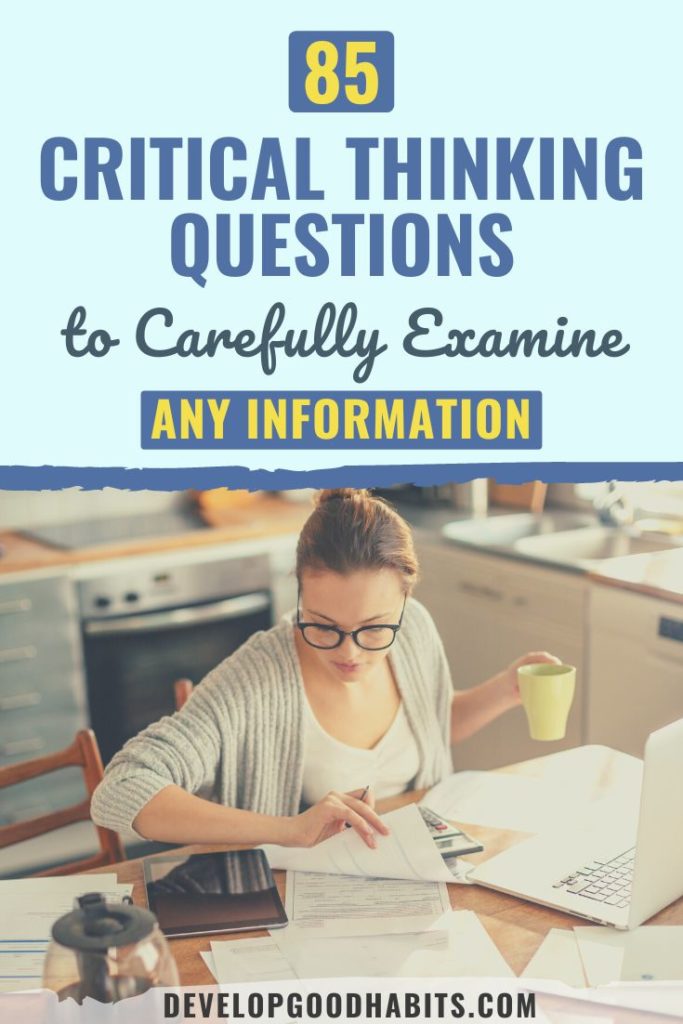
- Grades 6-12
- School Leaders
FREE Poetry Worksheet Bundle! Perfect for National Poetry Month.
100+ Critical Thinking Questions for Students To Ask About Anything
Critical thinkers question everything.
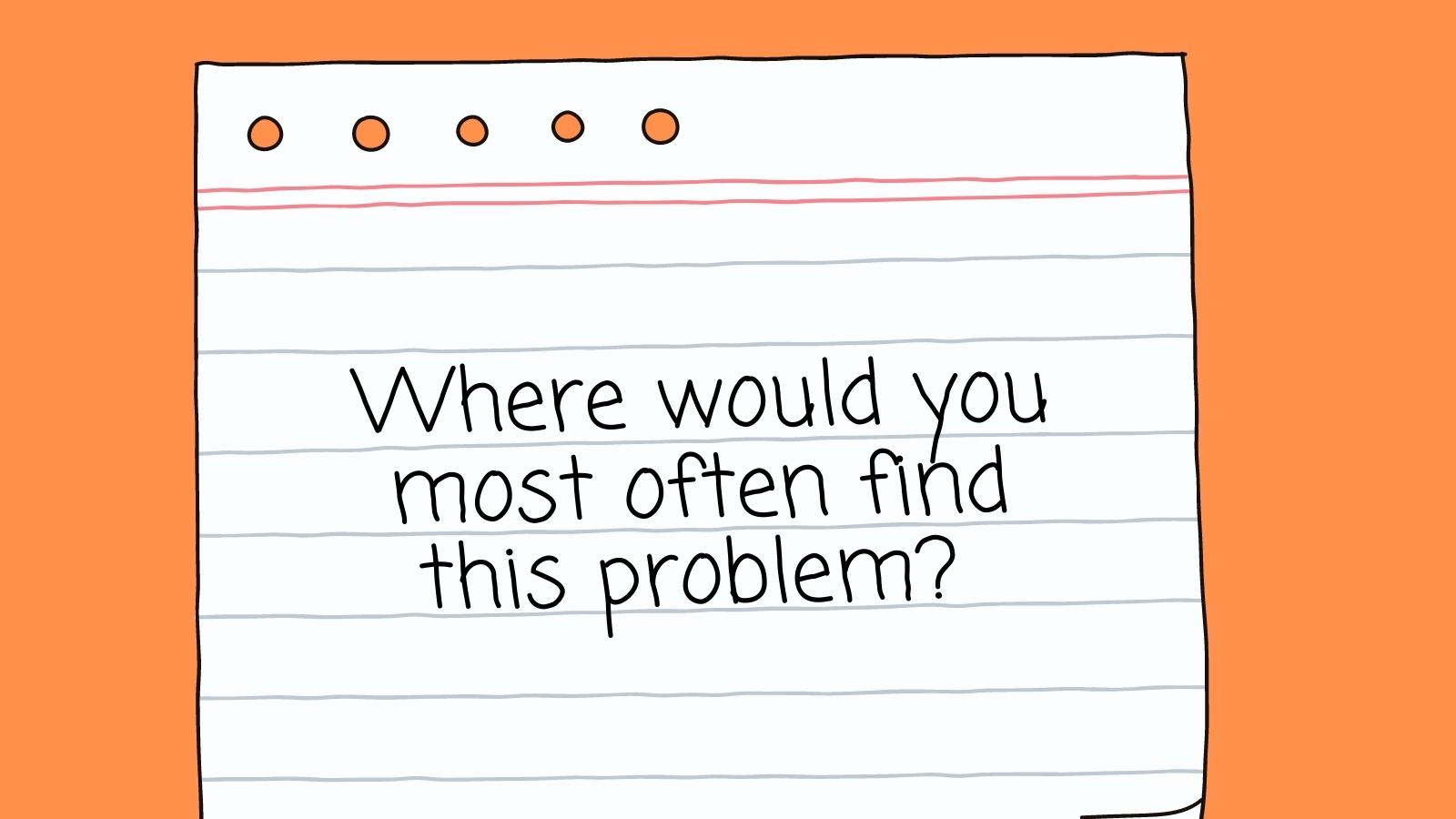
In an age of “fake news” claims and constant argument about pretty much any issue, critical thinking skills are key. Teach your students that it’s vital to ask questions about everything, but that it’s also important to ask the right sorts of questions. Students can use these critical thinking questions with fiction or nonfiction texts. They’re also useful when discussing important issues or trying to understand others’ motivations in general.
“Who” Critical Thinking Questions
Questions like these help students ponder who’s involved in a story and how the actions affect them. They’ll also consider who’s telling the tale and how reliable that narrator might be.
- Is the protagonist?
- Is the antagonist?
- Caused harm?
- Is harmed as a result?
- Was the most important character?
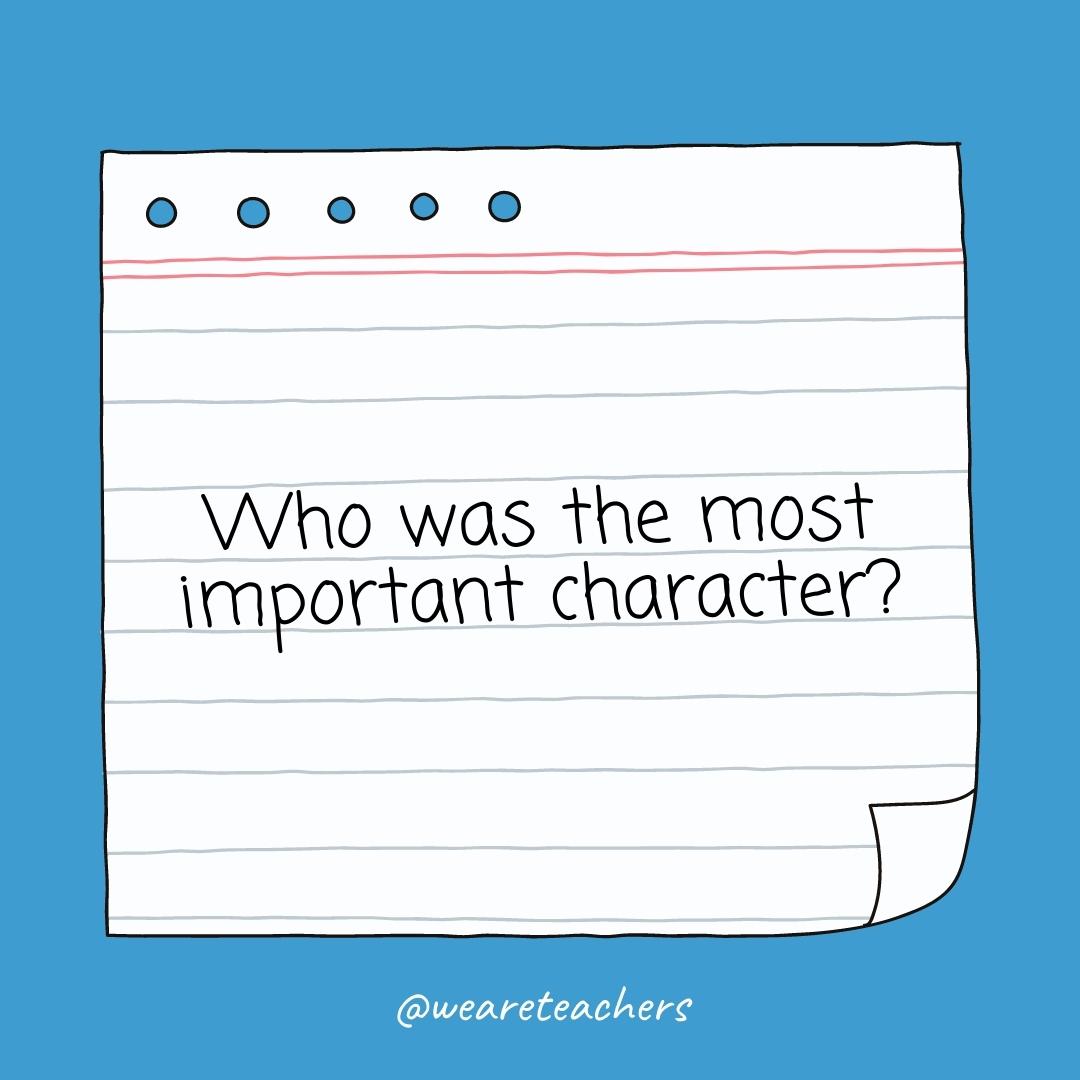
- Is responsible?
- Is most directly affected?
- Should have won?
- Will benefit?
- Would be affected by this?
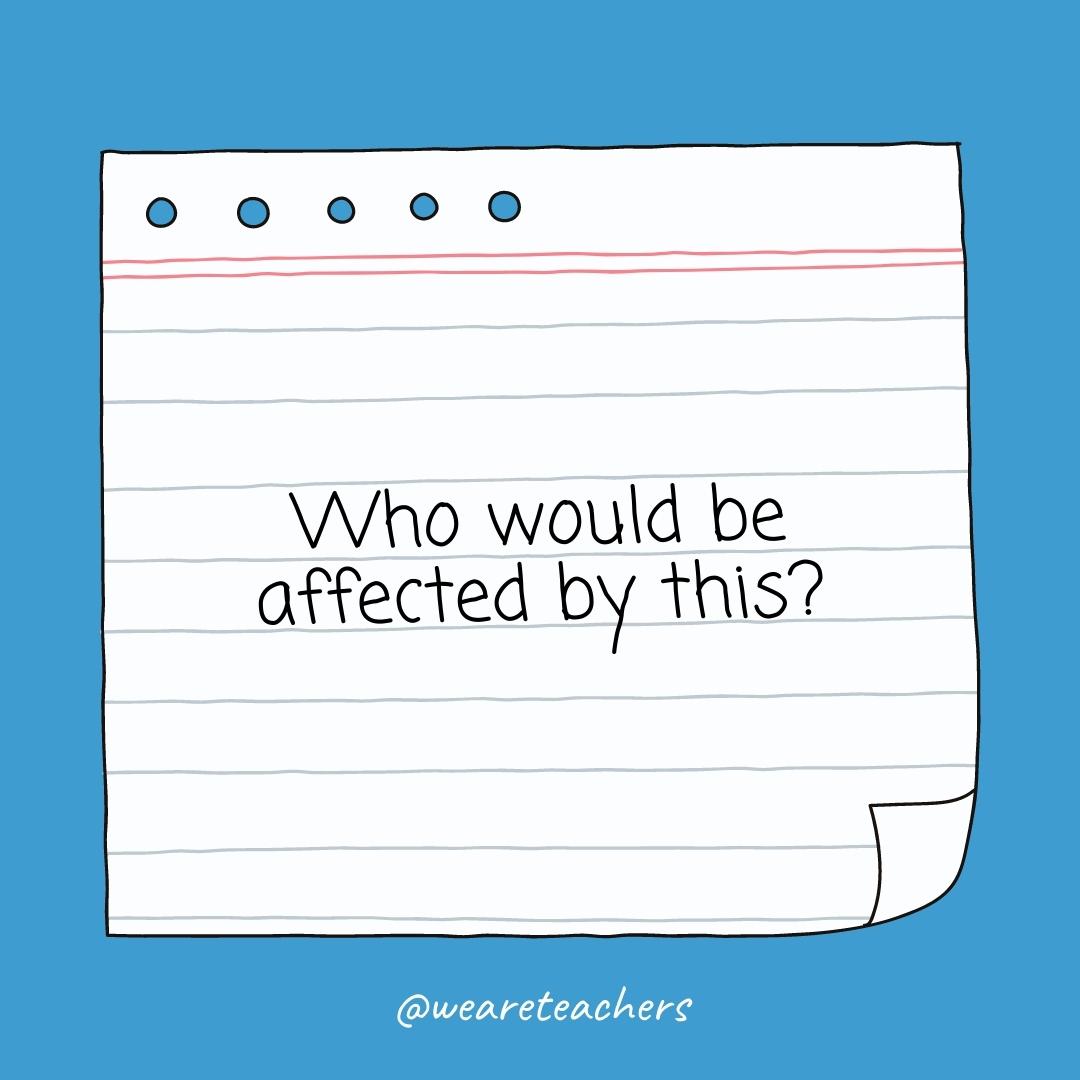
- Makes the decisions?
“What” Critical Thinking Questions
Ask questions that explore issues more deeply, including those that might not be directly answered in the text.
- Background information do I know or need to know?
- Is the main message?
- Are the defining characteristics?
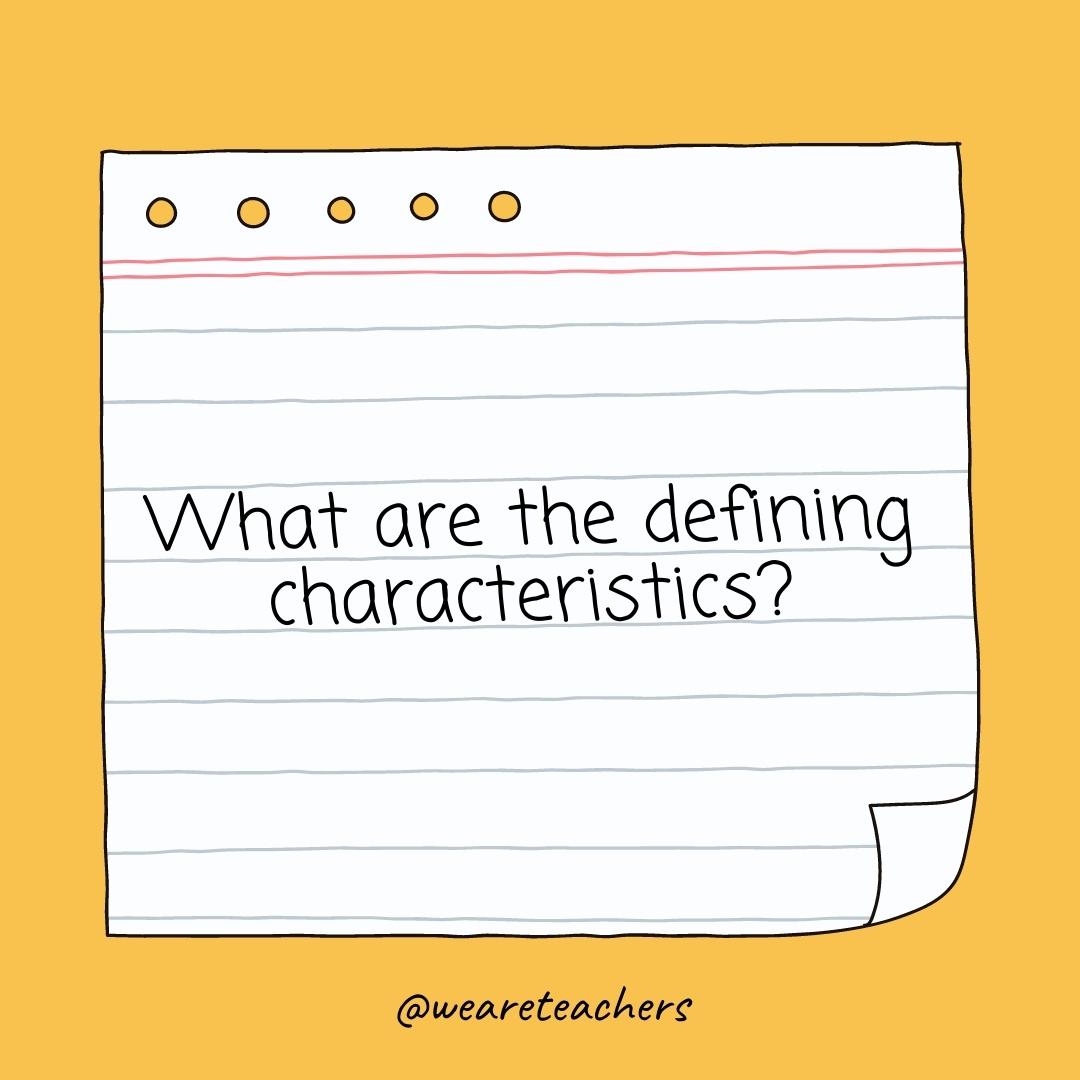
- Questions or concerns do I have?
- Don’t I understand?
- Evidence supports the author’s conclusion?
- Would it be like if … ?
- Could happen if … ?
- Other outcomes might have happened?
- Questions would you have asked?
- Would you ask the author about … ?
- Was the point of … ?
- Should have happened instead?
- Is that character’s motive?
- Else could have changed the whole story?
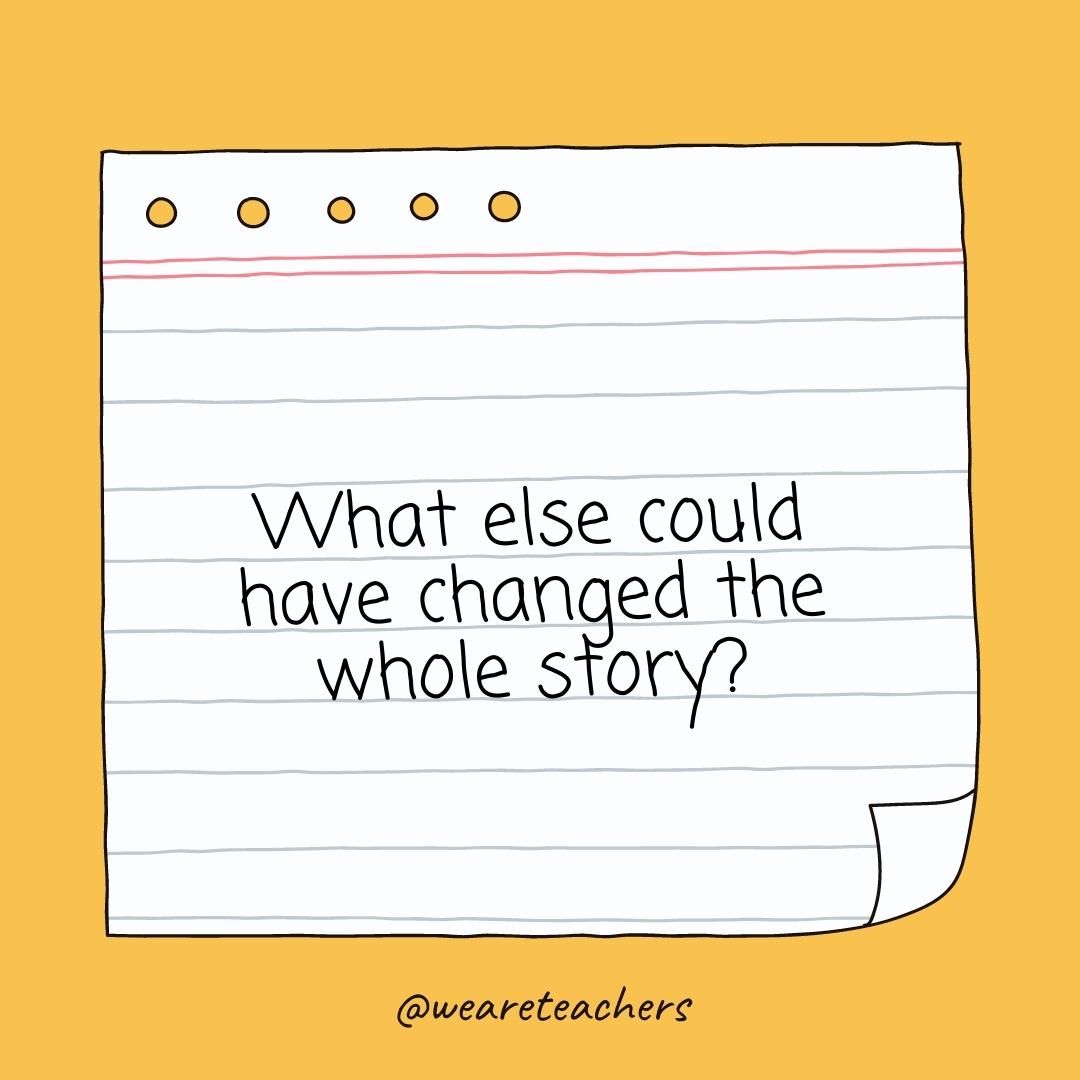
- Can you conclude?
- Would your position have been in that situation?
- Would happen if … ?
- Makes your position stronger?
- Was the turning point?
- Is the point of the question?
- Did it mean when … ?
- Is the other side of this argument?
- Was the purpose of … ?
- Does ______ mean?
- Is the problem you are trying to solve?
- Does the evidence say?
- Assumptions are you making?
- Is a better alternative?
- Are the strengths of the argument?
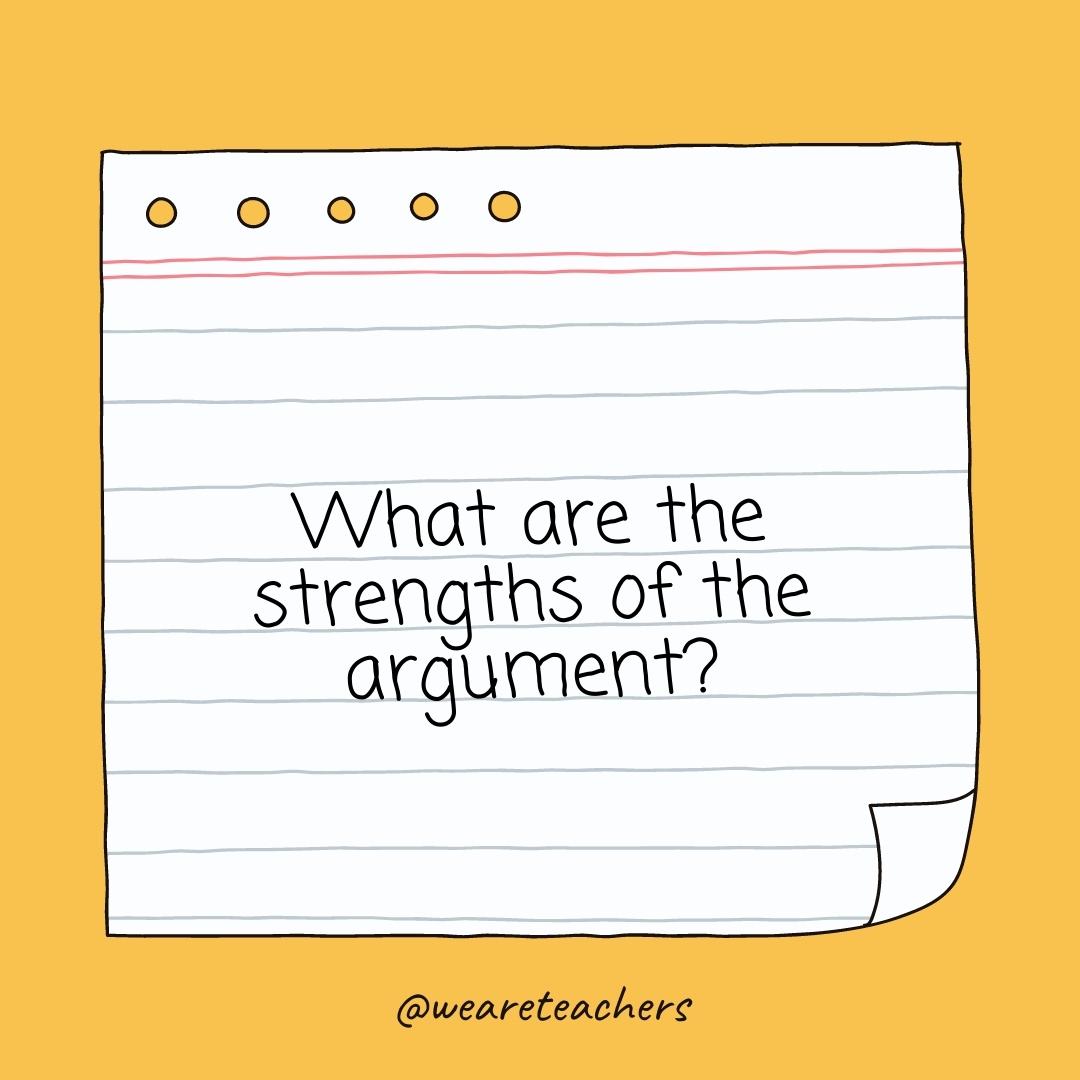
- Are the weaknesses of the argument?
- Is the difference between _______ and _______?
“Where” Critical Thinking Questions
Think about where the story is set and how it affects the actions. Plus, consider where and how you can learn more.
- Would this issue be a major problem?
- Are areas for improvement?
- Did the story change?
- Would you most often find this problem?

- Are there similar situations?
- Would you go to get answers to this problem?
- Can this be improved?
- Can you get more information?
- Will this idea take us?
“When” Critical Thinking Questions
Think about timing and the effect it has on the characters or people involved.
- Is this acceptable?
- Is this unacceptable?
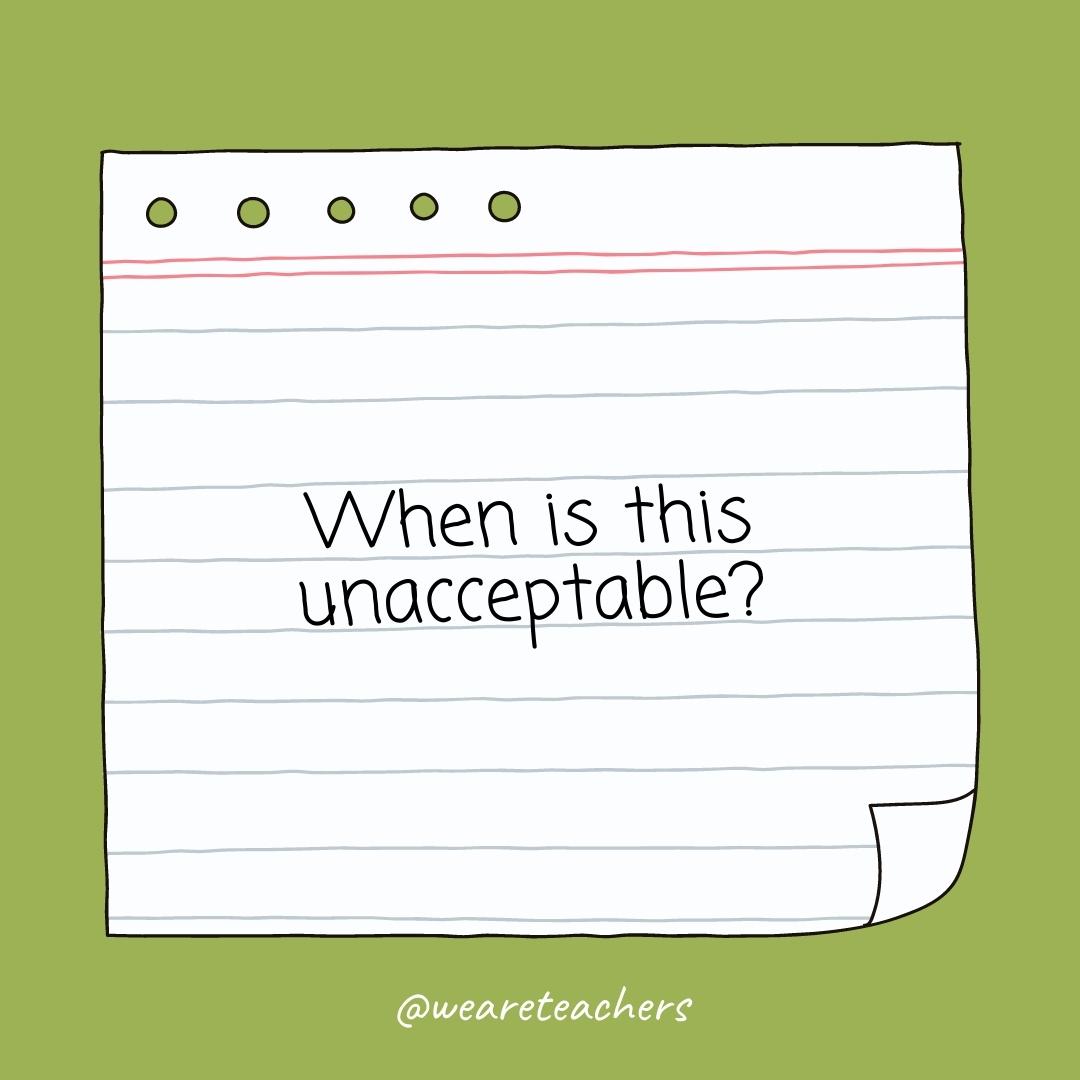
- Does this become a problem?
- Is the best time to take action?
- Will we be able to tell if it worked?
- Is it time to reassess?
- Should we ask for help?
- Is the best time to start?
- Is it time to stop?
- Would this benefit society?
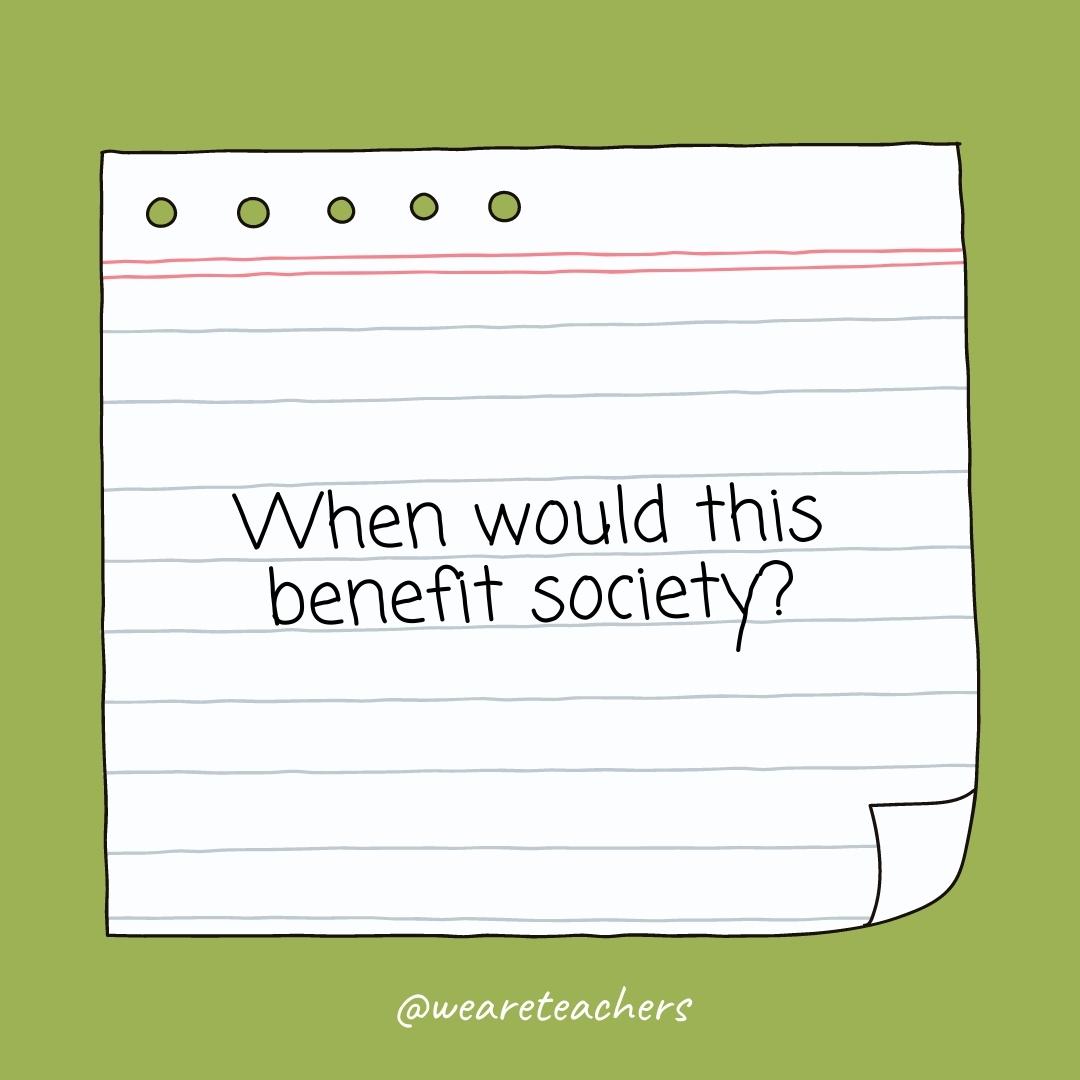
- Has this happened before?
“Why” Critical Thinking Questions
Asking “why” might be one of the most important parts of critical thinking. Exploring and understanding motivation helps develop empathy and make sense of difficult situations.
- Is _________ happening?
- Have we allowed this to happen?
- Should people care about this issue?
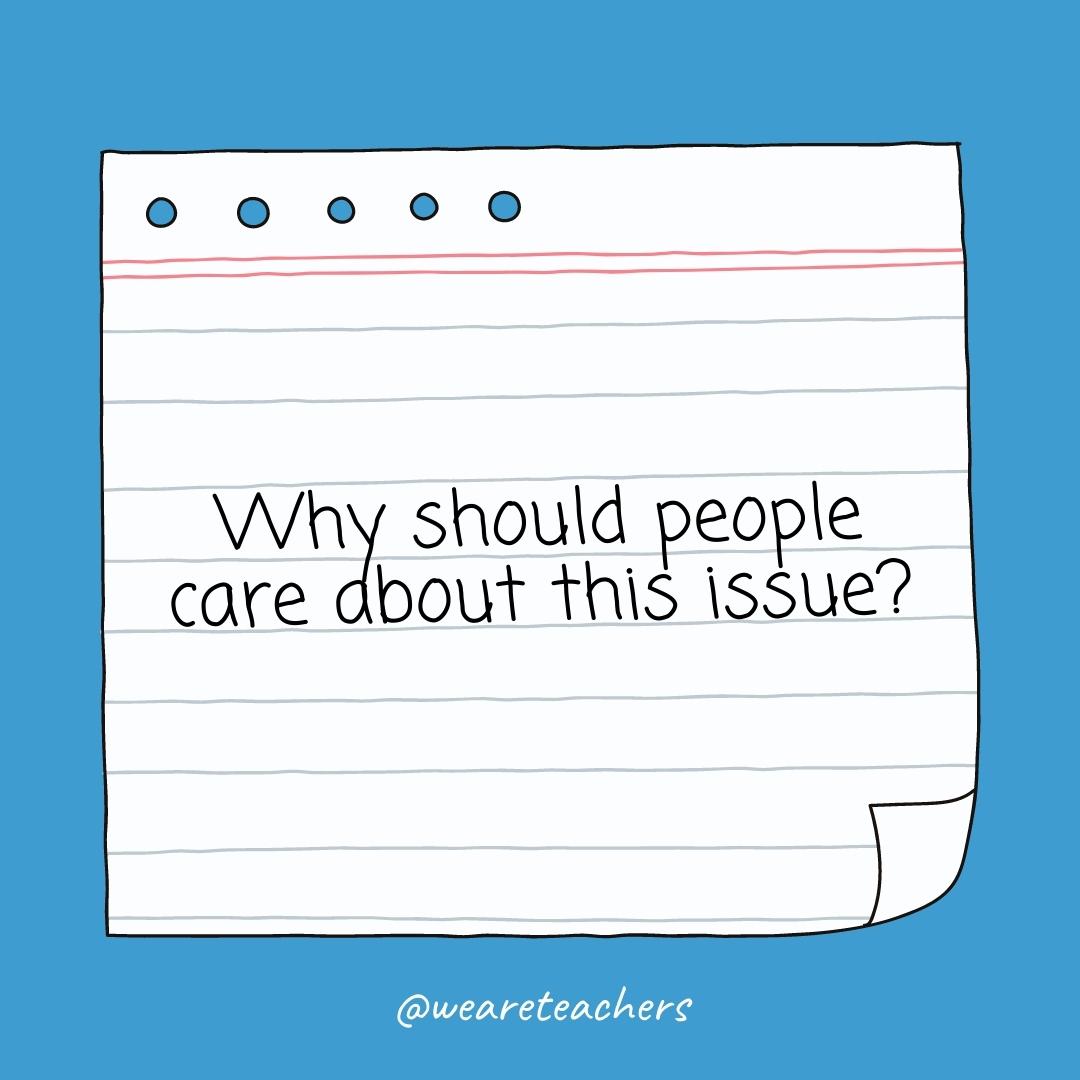
- Is this a problem?
- Did the character say … ?
- Did the character do … ?
- Is this relevant?
- Did the author write this?
- Did the author decide to … ?
- Is this important?
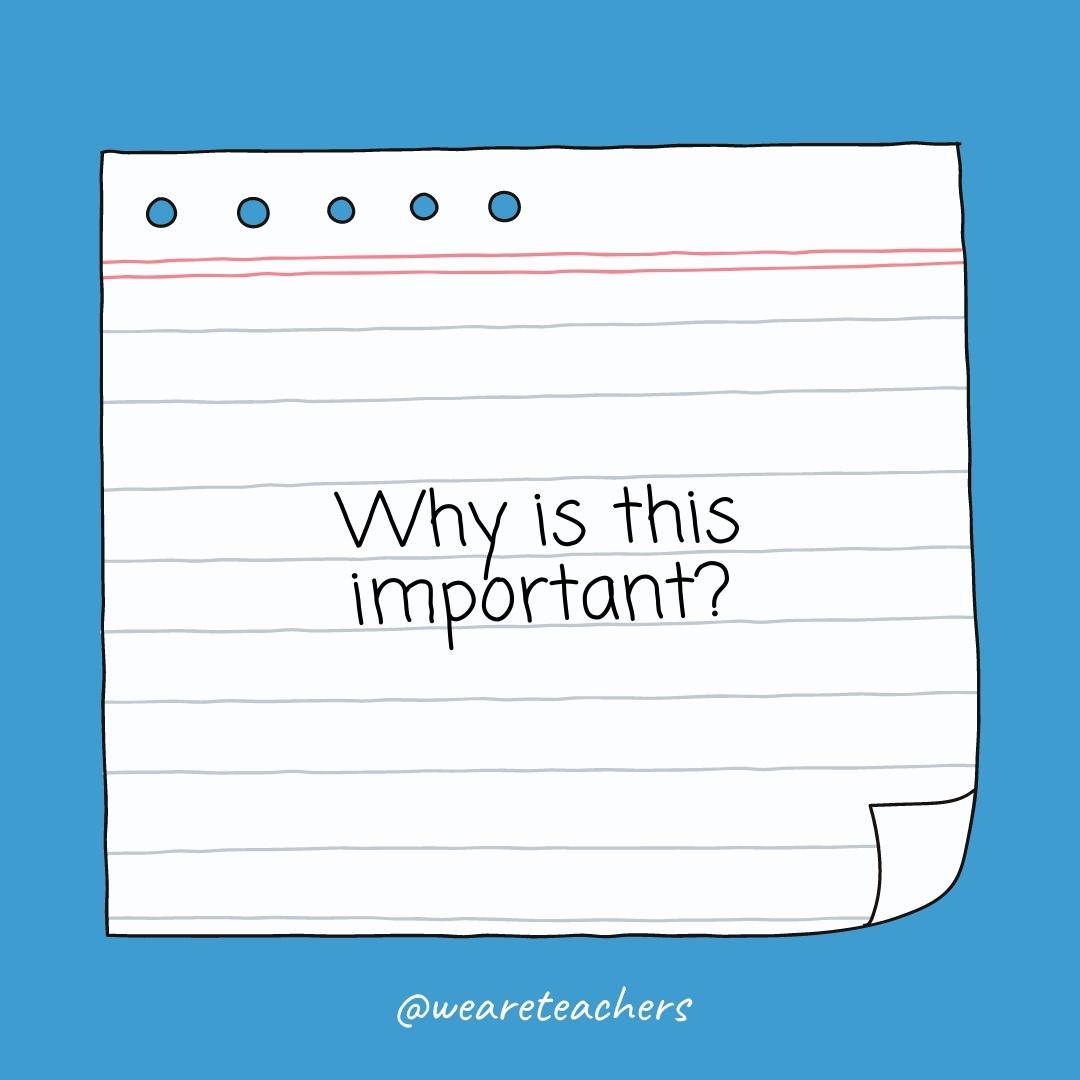
- Did that happen?
- Is it necessary?
- Do you think I (he, she, they) asked that question?
- Is that answer the best one?
- Do we need this today?
“How” Critical Thinking Questions
Use these questions to consider how things happen and whether change is possible.
- Do we know this is true?
- Does the language used affect the story?
- Would you solve … ?
- Is this different from other situations?
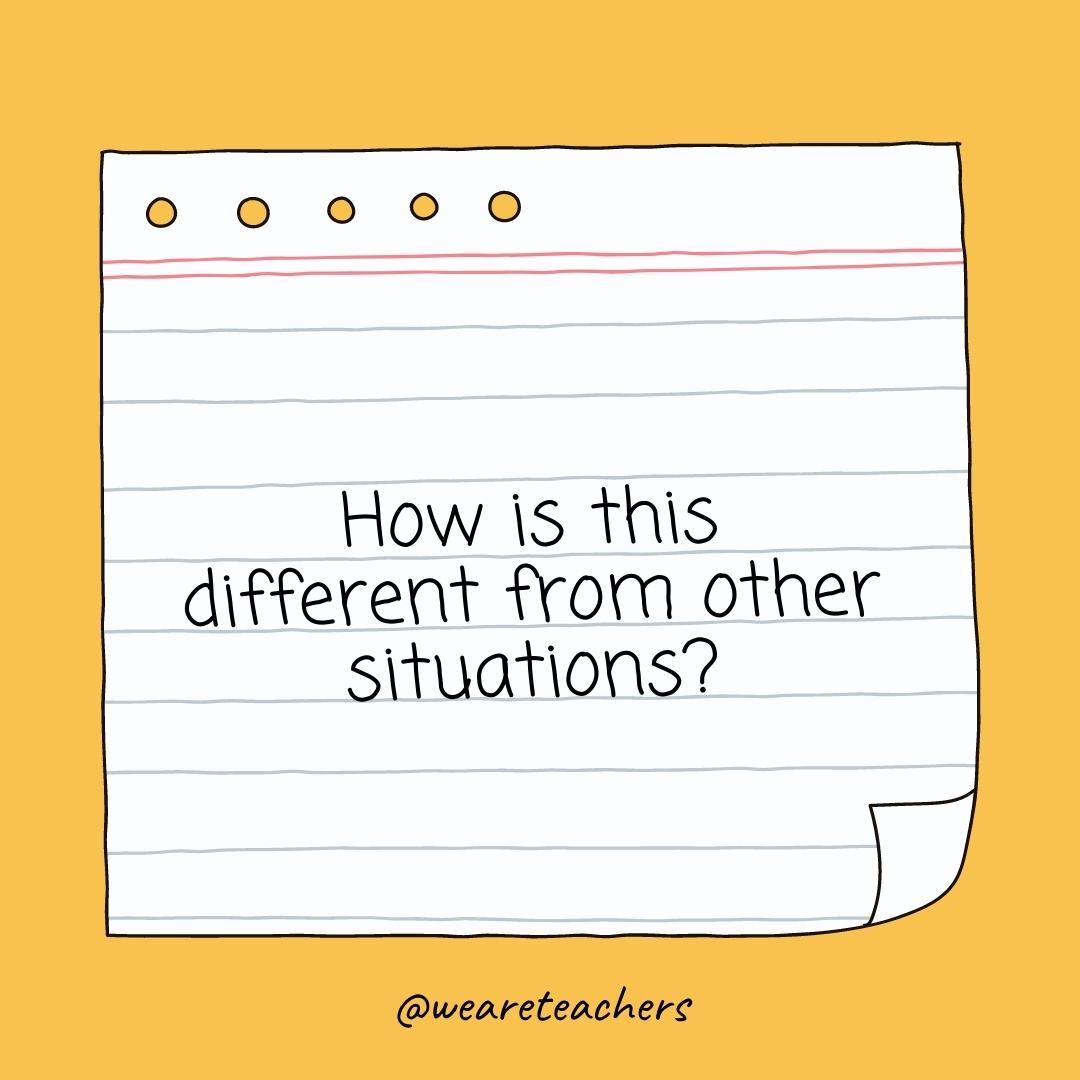
- Is this similar to … ?
- Would you use … ?
- Does the location affect the story?
- Could the story have ended differently?
- Does this work?
- Could this be harmful?
- Does this connect with what I already know?
- Else could this have been handled?
- Should they have responded?
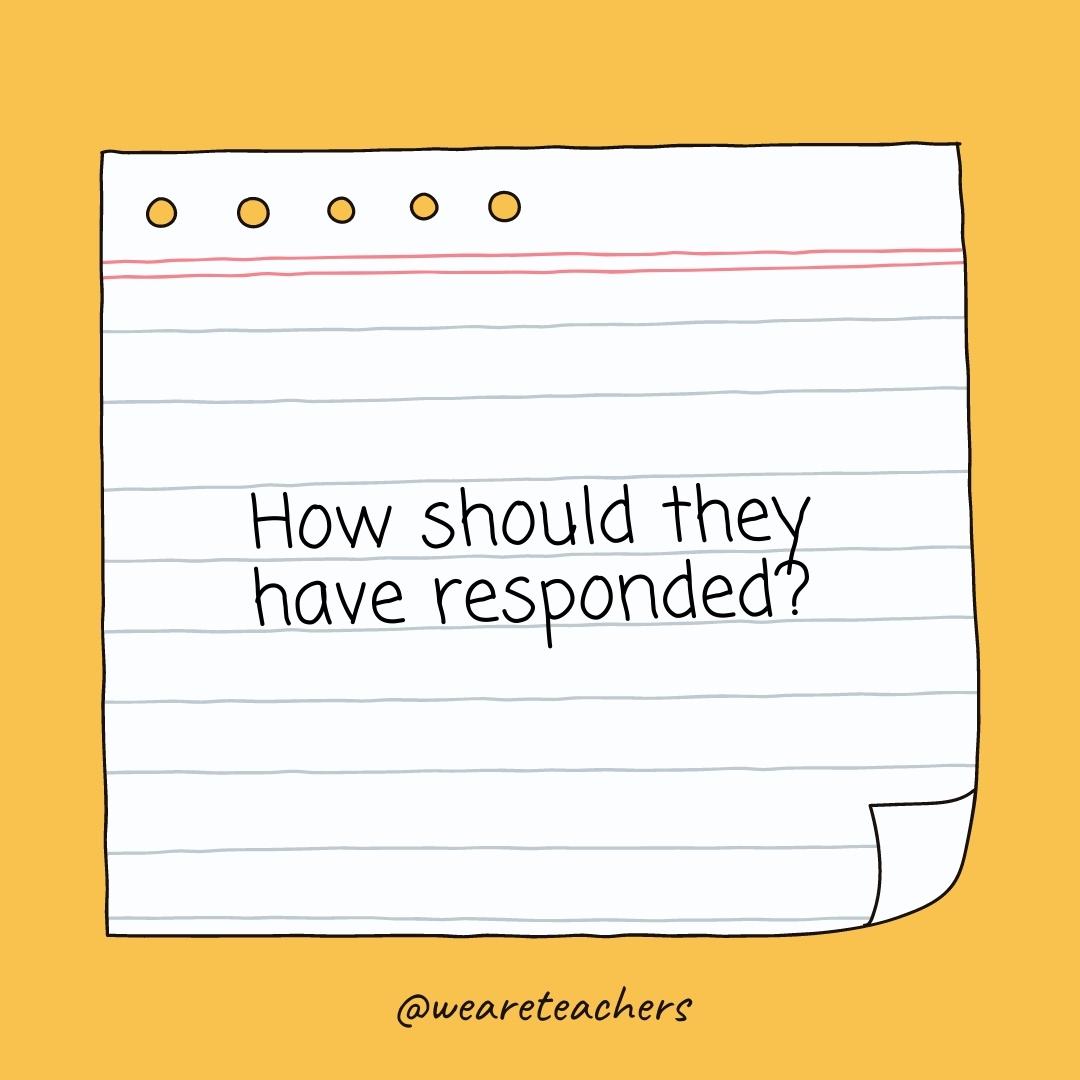
- Would you feel about … ?
- Does this change the outcome?
- Did you make that decision?
- Does this benefit you/others?
- Does this hurt you/others?
- Could this problem be avoided?
More Critical Thinking Questions
Here are more questions to help probe further and deepen understanding.
- Can you give me an example?
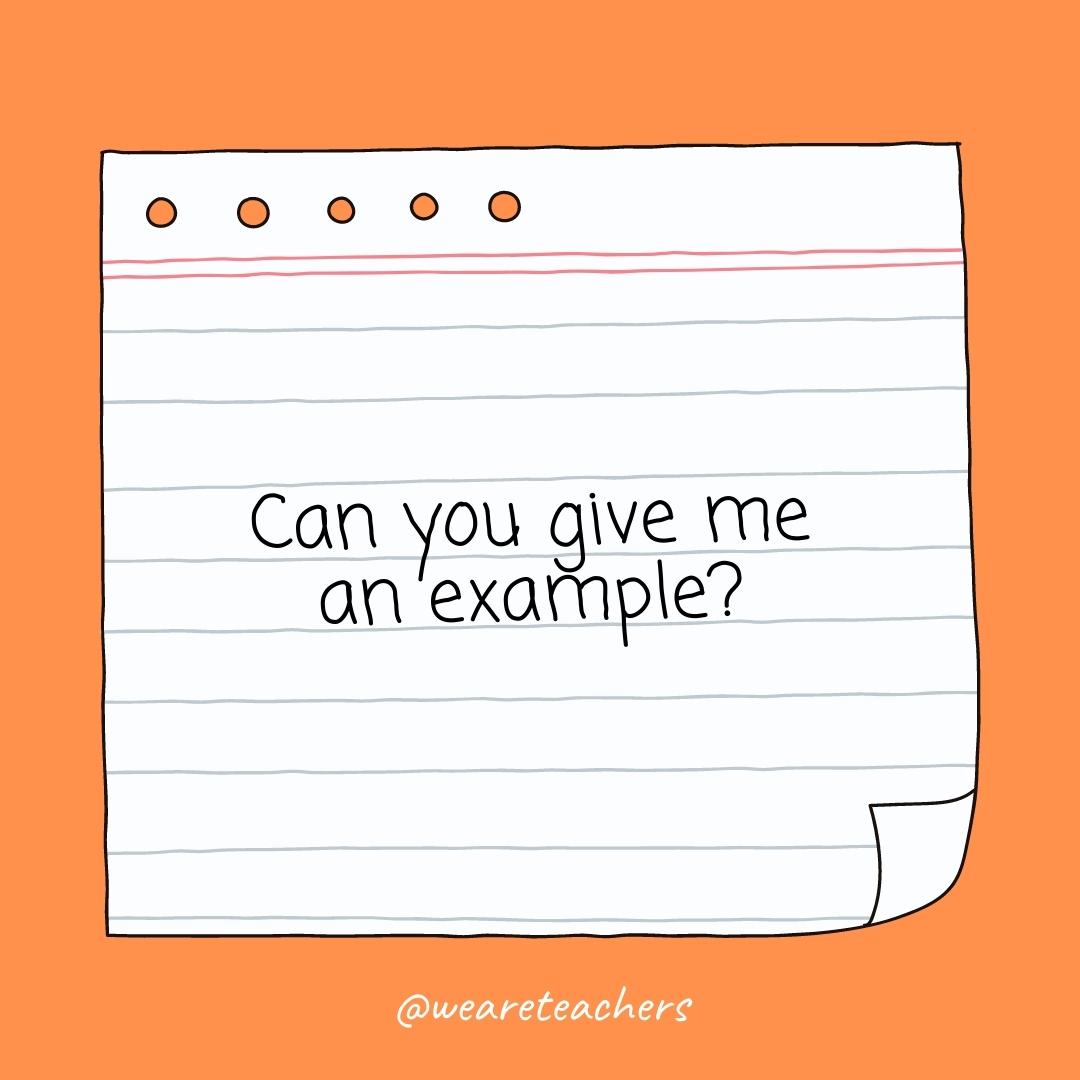
- Do you agree with … ?
- Can you compare this with … ?
- Can you defend the actions of … ?
- Could this be interpreted differently?
- Is the narrator reliable?
- Does it seem too good to be true?
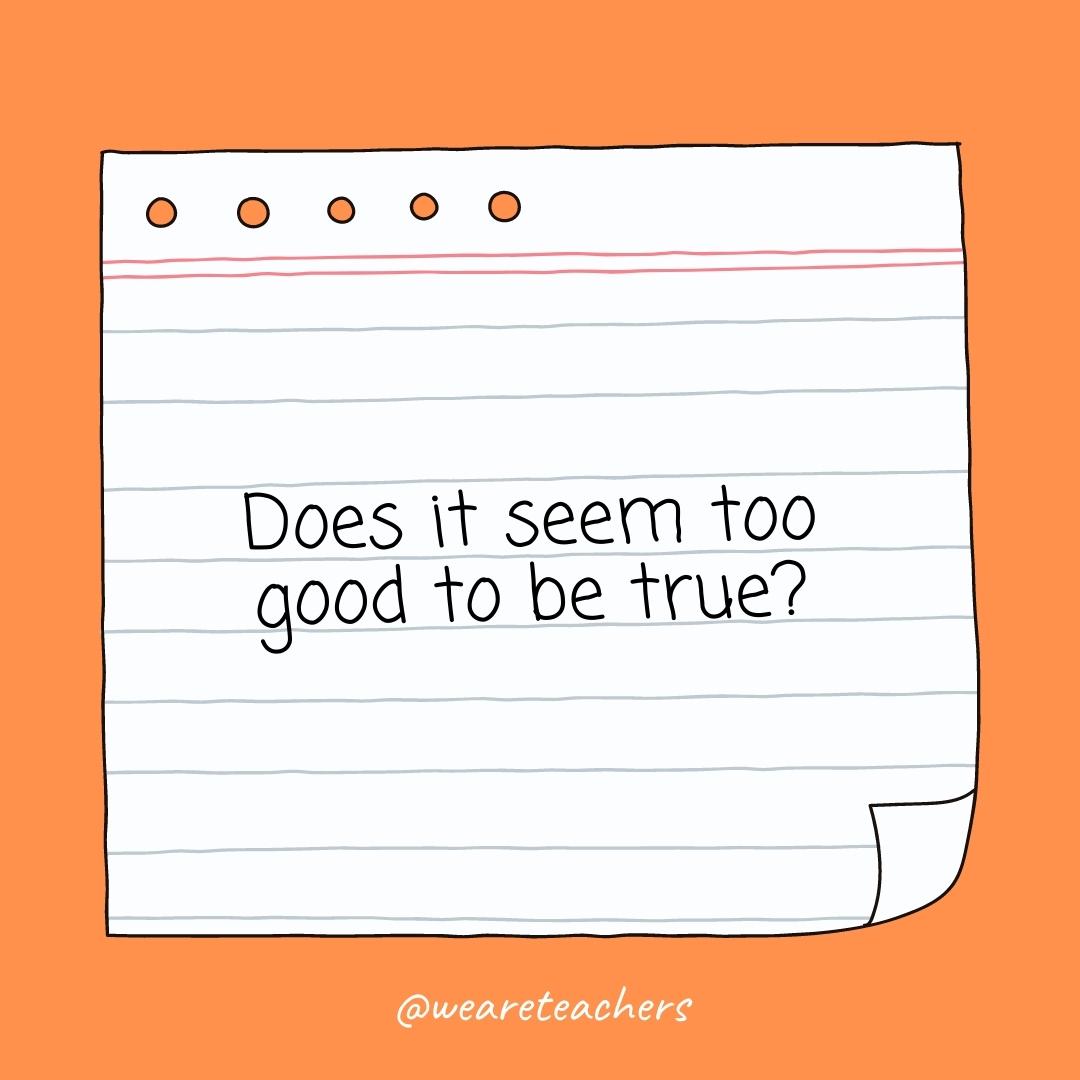
- Is ______ a fact or an opinion?
What are your favorite critical thinking questions? Come exchange ideas on the WeAreTeachers HELPLINE group on Facebook .
Plus, check out 10 tips for teaching kids to be awesome critical thinkers ., you might also like.
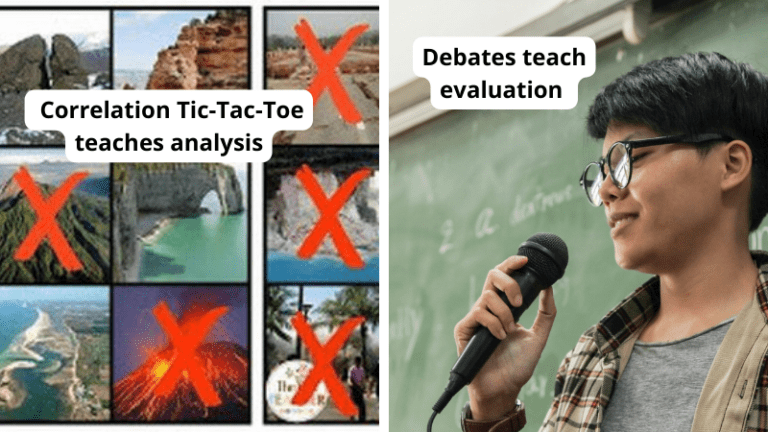
5 Critical Thinking Skills Every Kid Needs To Learn (And How To Teach Them)
Teach them to thoughtfully question the world around them. Continue Reading
Copyright © 2023. All rights reserved. 5335 Gate Parkway, Jacksonville, FL 32256

Critical thinking
200+ critical thinking questions.
“Judge a man by his questions rather than his answers.” – Voltaire As critical thinkers, it’s our job to question everything, instead of just blindly believing what we’re told, but what kinds of questions should we be asking though? What are the “right” questions to ask? In this article I’ve compiled a list of 200+ […]
“Judge a man by his questions rather than his answers.” – Voltaire
As critical thinkers, it’s our job to question everything, instead of just blindly believing what we’re told, but what kinds of questions should we be asking though?
What are the “right” questions to ask?
In this article I’ve compiled a list of 200+ of the very best critical thinking questions for almost any situation.
Critical thinking questions:
- If you’re presented with a claim
If you’re reading a book, listening to a podcast, watching TV or YouTube
If you’re watching an interview.
- In a group or panel discussion
- In an argument or debate
If you’re watching the news
- If you want to spot a lie
If you want to spot a scam
- If you’re presented with statistics
- Critical thinking about your life
Let’s begin:
- Is this an argument, a claim, a belief, an opinion, or a fact?
When you’re presented with information, whether it’s something you’re reading, watching or listening to, ask yourself:
- How do you know it’s a fact?
- What evidence exists to support this “fact”?
- Has this “fact” been proven?
- Do the majority of experts on the subject agree that this is a fact? Is there an expert consensus on this fact? If not, why not?
- Is this an ordinary or extraordinary claim?
- Do the majority of experts agree with this claim? Or is it contentious?
- What is the source of this claim?
- Who is making this claim?
- Is this person an authority or expert?
- How reliable is this source?
- What are the best arguments in support of this claim?
- What do the harshest critics against this position say?
- What arguments do skeptics of this position give?
- Has this claim already been debunked?
- Is this evidence good enough to accept the arguers assertions?
- Would this evidence stand up in court?
- Or is the arguer/author/speaker making assertions without evidence?
- What is the strongest evidence against this claim?
- Is there more confirming or disconfirming evidence?
- Is the expert consensus (if there is one) for or against this claim? Why?
- Do the majority of experts agree or disagree with this claim? Why?
- How can we verify or falsify this claim?
- A statement may be true, but is it relevant? Why?
- To what degree? To what extent?
- Under what conditions?
- In what context or circumstances?
- This claim is 100% true
- This claim is 100% false
- This claim is mostly true, partly false
- This claim is mostly false, partly true
- This claim is half true, half false
- Remember: There are degrees of “rightness” and “wrongness”. Statements are rarely 100% true or 100% false
- What further claims does this claim logically entail?
- Which of my beliefs would I have to change if I were to accept this claim?
- If this is an argument, is it deductive or inductive?
- If an argument is deductive, is it sound, valid, invalid, or unsound?
- If an argument is inductive, is it cogent, strong, weak, or unsound?
- How do you know this?
- How did you determine this?
- What evidence or proof do you have for this claim?
- What is their background?
- What makes them qualified to speak on this subject?
- Are they an expert in the field?
- On what basis is the author or speaker an authority or expert on the subject, or at least credible?
- Are they conservative or liberal?
- Atheist or religious?
- Feminist or MGTOW?
- (No author/speaker is completely neutral, unbiased and objective)
- When was the article, book, podcast, video etc., written or recorded? Is it possibly outdated? Is there a more recent up-to-date version available?
- Why did the author write this article/book?
- Why is the speaker giving this talk? What is their motivation?
- What is the purpose of this information? Why was it created?
- Why did I choose to read/watch/listen to it?
- Who benefits from this information? Why? How?
- Is this information relevant to you? If so, how? Why do you need to know this? How does it affect you personally?
- What are the authors/speakers main arguments and assertions? What is their philosophy? What are their main points?
- Is the author/speaker arguing for anything controversial? If so, there are likely to be good counterarguments on the other side
- Anonymous authorities aka “weasel words” e.g. “experts say…” “scientists say…” “studies show…”
- Deductive or inductive reasoning
- Expert opinion
- Expert consensus
- Randomized controlled trials
- Scientific studies
- Scientific consensus
- Or are they making assertions without evidence?
- What is the strongest evidence in support of these assertions? Is this evidence good enough to accept the authors/speakers conclusions? Would it stand up in court?
- What is the strongest evidence against these assertions?
- What might be another equally valid interpretation of the evidence or study results?
- What conclusions does the author/speaker want you to draw? What do they want you to think/believe/understand/do?
- Is the author/speaker/news station trying to push a narrative? e.g. “Diversity”, “Gender pay gap”, “Immigration”?
- Do you agree with the authors/speakers assertions? Why/why not? Anything you disagree with?
- Do you agree with the authors/speakers philosophy? Why/why not? Anything you disagree with?
- Do you agree with the authors/speakers “facts” and description of “reality”? Why/why not? Anything you disagree with?
- Do you agree with the authors/speakers arguments and rationale? Why/why not? Anything you disagree with?
- Are there any fallacies in the authors/speakers argument or rationale? If so, what?
- Does the author/speaker address counterarguments, disconfirming evidence, objections etc.? If so, how effectively do they rebut these points?
- If the author/speaker provides a “rule”, are there any exceptions to the rule that are not explained or accounted for?
- Do you agree with the authors/speakers conclusions? Why/why not? (You might agree with their arguments and rationale but not with their conclusions) Are they backed up by sufficient evidence? Or is the author/speaker jumping to conclusions too quickly from insufficient evidence?
- Are there any other equally valid conclusions or interpretations that could have been drawn from the evidence, or any other competing theories with better explanations for the evidence? If so, what?
- What is the perspective of the author/speaker? Do they seem like an insider or outsider? Why?
- Whose perspective is this information presented from? America’s or someone else’s? Conservative or liberal? Men or Women? Gen X, Y or Z?
- What perspectives/viewpoints are not represented here? What other perspectives might be equally valid, or worth looking into?
- What would (person) say about it?
- What would (group) say about it?
- Is there better evidence for one perspective/viewpoint than another?
- Is the author/speaker presenting you with both sides of the story – or only one?
- How has the author/speaker framed the information or story?
- Is the author/speaker embellishing or sensationalizing the story for dramatic effect? Do you think the story really took place the way the author/speaker tells it?
- What assumptions is the author/speaker making? What does the author/speaker have to believe is true before the rest of their argument makes sense?
- What are the implications of the authors/speakers argument? If this is true, what else must be true?
- What are the main problems the author/speaker is trying to solve? What solutions do they propose?
- Do you agree with the authors/speakers proposed solutions? Can you think of even better solutions to these problems?
- Has the author/speaker identified the real problem/s, or only a symptom of the problem?
- Is the author/speakers analysis or solution to the problem or situation oversimplified or incomplete? What needs to be unpacked or expanded upon?
- Is the author/speaker engaged in oversimplified black and white thinking as if something “always” or “never” happens, or as if “everyone” or “no one” should think/believe/do something, or as if something was right/wrong, true/false, correct/incorrect, without any grey areas in between?
- Are you engaged in black and white thinking, as if “everything” or “nothing” the author/speaker says is true? Or are you judging the validity of the information line by line, sentence by sentence, claim by claim, realizing that some parts could be true, and other parts false?
- Is the author/speaker emotional reasoning? Is it facts over feelings, or feels over reals?
- How would you describe the author/speakers tone? Dogmatic? Overconfident? Emotive? Pay attention not only to what is said, but how it’s said. How does the tone affect your response to the speech/text?
- Is the author/speaker using emotive language/tonality, and/or dramatic images or video, in an attempt to alarm, scare or outrage you?
- Is the author/speaker guilty of magical or superstitious thinking? Is there a lot of talk of “the law of attraction”, “miracles”, “soul mates” etc.?
- Does the author/speaker treat their opponents charitably and fairly? Do they treat the other side as intelligent people with a difference of opinion/perspective? Or do they demonize them as “crazy”, “dangerous”, “evil”, “dumb”, “stupid”, “racist”, “sexist”, “homophobic”, “transphobic” etc.?
- Does the author/speaker seem intellectually honest? Trustworthy? Why/why not?
- Is the author/speaker trying to be objective in their analysis and critique? Perfect objectivity isn’t possible, but are they even trying to be impartial, unbiased and objective?
- Yes: Be careful you’re not automatically believing everything they have to say without evidence, and letting them do your thinking for you
- No: Be careful you’re not automatically dismissing everything they have to say because you don’t like them (Remember: Examine the statement – not the speaker)
- Yes: Beware because you’re more likely to believe it whether it’s true or not
- No: Beware because you’re more likely to dismiss it whether it’s true or not
- The truth, the whole truth, and nothing but the truth
- Half-truths and holding something back
- Straight up lying
- Is the author/speaker misquoting people, or taking quotes out of context?
- Did the person really say …? Is this a real quote/tweet? Or has the person been misquoted or quoted out of context? Is this a fake tweet?
- How are you going to use this information? What are you going to do with it? How are you going to put it into practice? How will it make a difference to your life?
- What is the purpose of this interview? Is it to educate or entertain the audience? Is it to promote a product or service?
- Who is the interviewee? Why is this person being interviewed?
- When did this interview take place? Is this information possibly outdated and no longer relevant?
- Is the interviewer asking the interviewee mostly softball or hardball questions?
- Is the interviewer asking the interviewee a lot of leading, loaded or gotcha questions? Do they seem to be trying to lead or trap the interviewee? e.g. “Yeah, but isn’t it true that…”, “Yeah, but don’t you think…”, “Yeah, but what about…”
- Is the interviewer really listening to the interviewee? Are they making a real effort to try to understand the interviewee and their position, or are they simply trying to promote or condemn it?
- Is the interviewer deliberately trying to make the interviewee look bad? e.g. Are they being overly disagreeable or standoffish? Do they only ask hardball or gotcha questions and then interrupt the interviewee mid-sentence with another difficult question every time the interviewee starts to give a good answer?
- Does the interviewer interrupt or cut off the interviewee if they start talking about anything controversial, or if they start talking about anything that doesn’t align with the narrative of the network e.g. anti-abortion, pro-gun or pro-Trump comments?
- Has the interview been edited to make the interviewee look bad, to paint them in a negative light?
- What additional questions would you ask the interviewee that the interviewer didn’t ask?
If you’re watching a group or panel discussion
If you’re watching a group discussion or debate, especially on a contentious topic e.g. abortion or gun control:
- Who are the panel members? What makes these people authorities or experts on the subject?
- Are both sides of the debate equally represented with intelligent people? Or is one side represented by heavyweights and the other side lightweights?
- Is there an equal distribution of liberal and conservative pundits? Or is it a majority liberal panel with a token conservative? (or vice versa)
- Does the host seem biased towards one side over the other? Is the host picking sides and showing their approval/disapproval of one side?
- Is the audience showing an obvious bias to one side of the debate? Are they only applauding/booing one side of the debate?
- Is the host giving more airtime, credibility and/or respect to one side?
- Is the host trying to make one side look bad, ignorant or stupid?
In an argument or a debate
If you’re in an argument or a debate, or watching one:
- Is this an argument or an assertion? If it’s an argument, is it deductive, inductive or abductive? Is it sound or cogent? Valid or invalid? Strong or weak?
- Are all of the premises true and correct? Do all of the premises necessarily lead to the conclusion? Are there any unjustified leaps of logic?
- Am I clear on how each word is being defined in the argument?
- Is someone attempting to redefine words e.g. “rational”, “reasonable”, “racist” etc., to support their preferred conclusion?
- Is someone trying to shift the burden of proof? Note: The burden of proof is the obligation to provide evidence to support one’s assertion e.g. “You are guilty” and it is always on the one making the claim – not the other way around
- Has this argument already been debunked?
- Is someone making a PRATT? (Point refuted a thousand times)
- Is this a strawman or steelman argument?
- Is this the best argument in support of …?
- What are the best arguments in support of …?
- What are the best arguments against …?
- What is the strongest evidence in support of …?
- What is the strongest evidence against …?
- Is the preponderance of evidence for or against …? Is there more confirming or disconfirming evidence?
- Is the expert consensus (if there is one) for or against …? Why?
- Do the majority of experts agree or disagree with …? Why?
- Are there any fallacies in this argument or rationale? If so, what? (Fallacies don’t necessarily make an argument invalid but it’s still good to be aware of them)
- Am I 100% certain I understand my opponent’s position? Am I sure? Could I argue my opponent’s position convincingly? Could I steelman it? Could I pass the Ideological Turing Test? If not, you don’t understand it. Don’t argue for or against a position until you fully understand it
- What are the strongest points of my opponent’s argument?
- What are the weakest points of my opponent’s argument?
- What are the weakest points of my argument?
- What is the strongest evidence against my position?
- What are the best arguments against my position?
- How would I attack my argument if I had to?
- What do I like about my opponent’s position, and what do I dislike about mine?
- What aspects of my argument are likely to be unconvincing to those that don’t already agree with me?
- Does my opponent seem intellectually honest? Are they arguing in good faith? Are they willing to follow the evidence where it leads? Are they willing to admit when they’re mistaken or wrong? Am I?
- Does my opponent seem more interested in “winning” the argument or discovering the truth?
Ask the other person:
- How did you determine that?
- How did you come to that conclusion?
- What do you know that I don’t?
- Where am I wrong in my argument or rationale?
- What evidence would it take to change your mind, to convince you otherwise?
- Are these your real reasons for believing X? If all of these reasons were proven wrong, would you still continue to believe X? If yes, let’s not even worry about these reasons because they’re not the real reasons you believe X. What are the real reasons you believe X?
- Why do you think other smart people aren’t convinced by the same arguments and evidence that you are?
- Associated Press News
- The Bureau of Investigative Journalism
- The Economist
- Pro Publica
- What is the bias of this news station? Are they liberal or conservative? You can check the bias of a particular news station here: Media Bias Fact Check
- Fear mongering
- Gossip/rumors
- Hatchet jobs
- Outrage porn
- Puff pieces
- Is this really the most important “news” of the day? Why is this story being prioritized over everything else that happened today?
- Why do I need to know this? How does it affect me?
- What is the purpose of this news story? Why was it created? What does the news station want you to think/believe/do?
- When was this news story published? Is this information current, or is it outdated and/or no longer relevant?
- Has this story already been debunked?
- Truth or Fiction
- The Washington Post Fact Checker
- Hoax Slayer
Check these websites to see if a claim or story has already been debunked, but don’t rely on any of these websites to do your thinking for you, because they may mislead you with their own political biases
- Has this story or headline been written to educate, entertain or infuriate you?
- Is the headline an accurate summary of the information – or is it just clickbait?
- Do the photos fit the story?
- Has an unflattering photo been deliberately chosen to paint the subject e.g. Trump in a bad light?
- Is it likely that this story has been embellished or sensationalized?
- How has this information been framed or spun?
- Are you being presented with both sides of the story – or only one?
- Whose perspective is this presented from? Conservative or liberal? America’s or someone else’s? Men or Women? What other perspectives might be equally valid, or worth looking into?
- What do the other news stations say? e.g. if you watch CNN or MSNBC, what does CBS or FOX say? (and vice versa)
- Are you being presented with facts or opinions? If “facts”, on what basis are they “facts”? What evidence exists to support these “facts”?
- Do the media’s “facts” and description of “reality” seem accurate? Why/why not? Anything you disagree with?
- Did someone really say that? Or have they been misquoted or quoted out of context?
- Does the domain look credible?
- Is this satire?
How to spot a liar
- Does it seem like this person is lying or telling the truth? Why? Are they a known liar?
- Is this person motivated to deceive me? Do they stand to gain something by lying to me? What might this person gain by lying to me?
- Dodge the question
- Ignore the question
- Attack you for asking the question, “How could you ask me a question like that!”
- Refuse to answer the question
- Answer a different question
- Turn the question back on you, “I could ask you the same thing!”
- Give short one word answers
- Give vague or ambiguous answers
- Talk around in circles without answering the question
- If you ask the person the same question multiple times using different words, do they give different answers and contradict themselves? Do the details in their story keep changing?
- Uncomfortable
- Does the person speak slower or faster or louder than normal when answering your questions?
- Does the person hesitate, take long pauses, or talk slower than normal when answering your questions? (maybe in an attempt to think on the spot and buy time?)
- Do they avoid eye contact and/or cover their mouth when answering questions?
- Do they start sentences and not finish them, or change topics and start talking about something else mid-sentence?
- Does the tone or volume of their voice change? Does their voice crack and/or go higher than normal? Do they cough repetitively and clear their throat, or stammer or stutter?
- Do they blink rapidly, or not at all, or have a fake or nervous smile?
- Do they roll their lips back or purse them?
- Does their body language seem uncomfortable?
- Do their emotions and facial expressions match their words? When they say they’re “good” or “okay”, do they seem good or okay?
- Does it seem like they’re in a hurry to change the subject?
- This person is telling “The truth, the whole truth, and nothing but the truth”
- This person is telling half-truths and holding something back
- This person is playing dumb and pretending to know less than they do
- This person is straight up lying
- What does your gut/intuition say? Does it seem like they’re lying or telling you the truth? (or both)
- Is a stranger emailing, texting or calling you out of the blue claiming something too good to be true? e.g. you’ve entitled to a large inheritance – and all you need to do is provide bank details, or pay taxes or transfer costs? Or that you’ve won a prize in a competition or lottery you’ve never entered?
- Is someone calling you claiming to be from your bank, gas/electricity provider, phone company etc. and asking you to verify your personal contact details, password, bank details, credit card number etc.? maybe due to “unauthorized” or “suspicious activity” on your account?
- Does a google search on the exact wording of the email, text or ad reveal a scam?
- Does the email contain any grammatical or spelling errors, or overly formal language?
- Does the email ask you to click a link or open an attachment?
- If you’re buying something online is the seller asking you to make payment with an insecure payment option? e.g. direct bank transfer, money order, or a cryptocurrency like Bitcoin?
- In an online dating scenario, is someone professing strong feelings for you after only a few encounters?
- Does the person have a sense of urgency? Are they claiming to need money urgently for a personal or family emergency, medical attention, or to come see you?
- Is someone using pressure tactics, and trying to make you feel guilty or selfish for not buying their product or service, or donating to a charity?
- Is someone trying to manipulate you with sleazy sales/self-help seminar type questions e.g. “Do you want to be rich or poor?” “A winner or a loser?” “A success or a failure?”
- Does it seem too good to be true? Does it seem like a scam? If so, it probably is
- What does your gut/intuition say?
Statistics questions
“There are three kinds of lies: lies, damned lies, and statistics.” – Benjamin Disraeli
Ask yourself the following questions whenever you’re presented with any statistic:
- Who paid for the study or survey?
- Who conducted the study or survey? Does it come from a credible source?
- Why was the study or survey done? What is the likely agenda?
- When was the study done? Is the information outdated? Is it still relevant? Times change. Public opinion changes
- Who was polled? Conservatives or liberals? Men or women? Asians, Blacks, Hispanics or Whites? What age group? Gen X, Y or Z? How diverse was the group?
- How large was the sample size? How many people were surveyed? Is the sample size large enough? Is it qualitative, quantitative, or mixed methods? Was the sample size sufficient? Was it representative enough of the wider population? Did the participants come from different cultural and social backgrounds? How generalizable are the findings?
- What are the statistics measuring?
- How long did the information take to gather? Was it a 2 week survey? A 6 month study? A 10 year study?
- What questions were asked?
- How was each question asked? Were the questions leading or loaded or worded in such a way as to encourage a certain answer?
- What is the context of the survey?
- How was the research done? Phone, email, social media, face to face?
- What is the number as a percentage? e.g. 55, 000 Americans is 0.0167% of the population
- Is the percentage statistically insignificant? e.g. 500, 000 Americans might be addicted to Heroin, but as a percentage that’s ‘only’ (any number above one is obviously too high) 0.153% of Americans
- Do the author’s conclusions and the headline logically follow from the data? Or are they reading too much into the data? Find the raw data if you can. Don’t just accept and believe headlines for statistics. Make sure it says what the headline says it says. Statistical headlines are often used to suggest things the data doesn’t actually say
- Is the research confusing causation and correlation? Check out: spurious correlations for a perfect visual example of why correlation does not equal causation
- Has this study been peer reviewed by experts?
- Beware of unsourced statistics
“I can prove anything by statistics except the truth.” – George Canning
Critical thinking about your life questions
“The unexamined life is not worth living” – Socrates
You can apply critical thinking to the books you read, the podcasts you listen to, the information and “news” presented to you, but ultimately, what better place to apply critical thinking skills than to your own life?
- Which biases and fallacies are you most guilty of?
- Where/when do you most often fail to practice critical thinking?
- What are your sacred cows? What shouldn’t be questioned? What is off limits? God? Jesus? Buddha? Krishna? Muhammad? The Bible? The Bhagavad Gita? The Quran? Your Guru?
- What do you need to start/stop doing?
- What do you need to do more/less of?
- What are your best/worst habits?
- Where do you waste the most time?
- Who/what should you cut out of your life?
- What one thing, if you were to take action on it, would produce the greatest difference in your life?
- A year from now, what will you wish you had started today?
Recommended reading
For additional critical thinking questions check out:
Critical Reading: The Ultimate Guide
The Socratic Method
50 Critical thinking tips

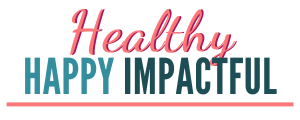
150 Fun Critical Thinking Questions For Kids, Teens, & Adults
Critical thinking questions for kids get them thinking and questioning. To go beyond rote learning.
The reason they excel later in life will not be based on the information they memorized. But instead on how well they think, make decisions, communicate, and use their creativity.
These questions are designed to help them build these essential skills.

What makes a good critical thinking question?
Open ended questions are perfect for encouraging critical thinking and problem-solving. Kids (and grown-ups) have to think about their answers. Below you will find the best age-appropriate examples to use in the classroom, at home, or during your everyday routine .
In fact, there’s no question about it. Critical thinking is important for kids. And adults too!
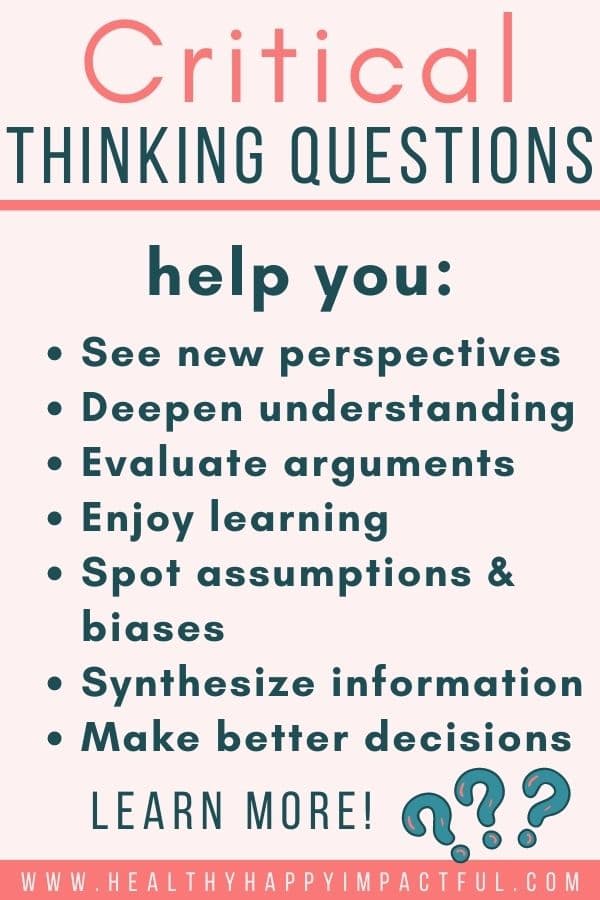
Good Questions For Kindergarten To Think Critically
Younger kids need more concrete questions. These critical thinking questions will help them use reasoning and think deeply, even when they are small.
1. How do you know if something was a good decision?
2. How are these two things similar?
3. What are the differences between _______ and _________?
4. How would you feel if __________?
This question is great for building empathy .
5. Who was the main character? Why do you say that?
6. When is ___________ a problem?

7. What is the problem?
8. Why is this a problem?
9. What did you notice about _________?
10. Do you think he/she sees this the same way you do? Why or why not?
11. Has this happened before?
12. Do you think it will happen again? Why do you think this?
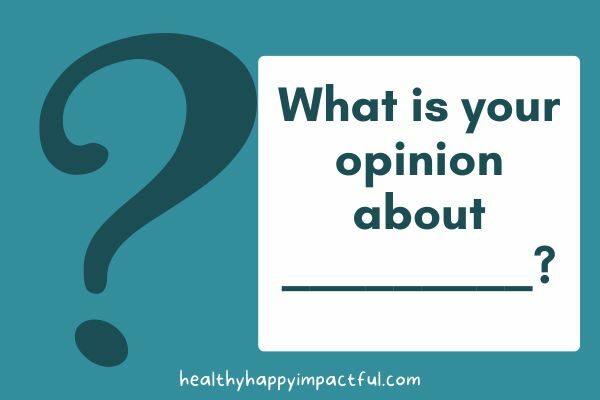
13. What is your opinion about _________? Why?
14. Is this appropriate? Why or why not?
15. What do you think would happen if __________?
16. What caused this to happen?
17. Do you think the world would be better if __________?
18. If you were in charge, what would you do differently?
19. Where can you find out more about this?
20. What does ______ mean?
21. Do you agree?
22. Can you give me an example of ________?
23. How do you know?
24. How would you solve this problem?
25. What makes something weird? What makes something normal?
Questions For Students: Elementary Through Middle School
For this age of kids, use any of the examples above and try these more abstract critical thinking questions too.

26. What do you think was the turning point?
27. Is there evidence to support your opinion (or decision)?
28. What does the evidence tell you?
29. What do you think would have been a better ending to… (book, movie, story)
30. When is the best time to start this?
31. When you think about solving a problem, where do you like to start?
32. What character/person changed the most? Why do you think this?
33. How could the author have created a thrilling twist in this story?
34. Who could help you with this? Why would they be a good fit to help?
35. Why is this important?
36. Why do you think ________ said that?
37. Why did the __________ (author, speaker) write/say this?
38. How does an idea grow? Or how does someone get from being a beginner to being an expert?
39. Do you think that what happened is what they meant to happen?
(Often, results are different than what people first think they will be.)
40. What can you use to help you decide?
41. What are the pros and cons of this?
42. Why is this happening?
43. What is the main message from this? (Or the lesson learned?)
44. What would you ask the author (speaker, etc.) if you could?
45. Do you have any questions about this?
46. Do you think it is too good to be true?
47. Can you defend these actions?
48. Compare this with this.
49. What would the world be like if ________? (kids were in charge, the sun was farther away, etc.)
50. Do you think there is a better alternative?
51. Is this person trustworthy? Why or why not?
52. At what age does someone stop being a kid? Why?
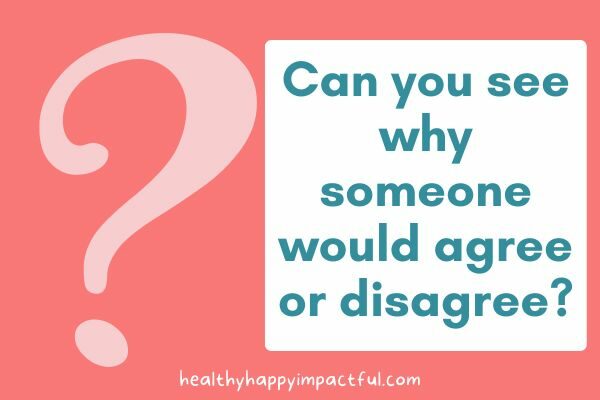
53. Can you see why someone would agree or disagree?
54. How would this ________ benefit or help others?
55. How will you know if your idea worked?
56. What is wrong with this situation?
57. What is good in this situation?
58. If someone were to argue your point, what do you think they would say?
59. Why do you think the character/person did that?
60. Is this fact or opinion? How do you know?
61. Was this change for the better? Or did it make things worse?
62. Who is most likely to _________? Why?
63. What do you think are the consequences of this decision?
64. Do you think we are asking the right question(s)? What is a different question instead?
Related Posts:
- Best Thought-Provoking Questions
- Deep Questions For Kids & Adults
- Philosophical Questions To Ponder With Kids
Critical Thinking Questions For High School & College Students
These critical thinking questions are more complex. They encourage abstract thinking, plus explore logic, ethics, and reasoning.

65. Why did you make that decision?
66. How did you get to that decision? What was your thought process?
67. What are the advantages of this?
68. What are the disadvantages of this?
69. How could we make this (project, paper, etc.) better?
70. What do you think the problem is….?
71. What do you think the best solution for this is? Why?
72. Could someone interpret this differently? How so?
73. How would you explain this to someone who doesn’t know anything about it?
74. What are a few alternative possibilities? Are any better than the others?
75. What are the short-term implications of this decision?
76. What are the long-term implications of this decision?
77. How would you achieve a big goal ?
78. (After they come up with a solution to something) Are there other possible ways to solve this problem?
79. How can you use the pros and cons to make a good decision?
80. Do you think when many people do something, it seems more “right,” even when it isn’t?
81. What are the potential risks to this decision?
82. What are the strengths of this argument?
83. What are the weaknesses of this argument?
84. Where is this lacking in evidence?
85. What can this story teach us about life?
86. Where would this solution work? Where would it not work?
87. Why do you think it is important to ask this question?
88. Why are new ideas important in our society?
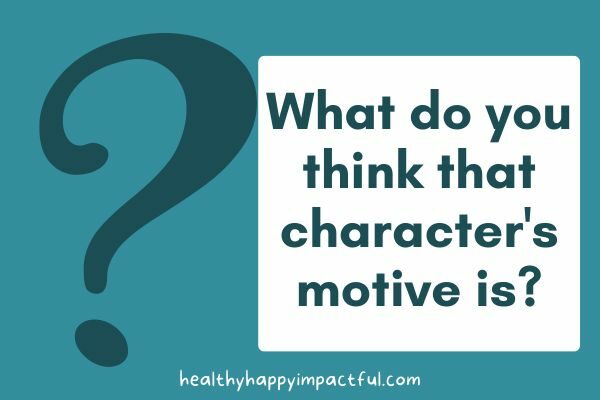
89. What do you think that character’s motive is?
90. When should you reevaluate your initial thoughts/decision?
91. Do you think this is an important issue?
92. What do you think should have happened instead?
93. What is the counterargument?
94. Why is this relevant?
95. Do you think ________ will ever happen?
96. If it does, who would it affect most? Why?
97. What assumptions are being made in this situation?
98. Is it ever ok to lie?
99. Why do you think this feels like __________?
100. How is this related to your values and beliefs?
- Best Topics To Discuss With Others
- Ice Breaker Questions To Get to Know Someone
- Best Questions To Ask Teens
Critical Thinking Questions For Adults
These are great for a conversation at home or at work interviews to see how well potential candidates think on their feet.

101. Where do you see strengths?
102. Where do you think there are areas for improvement?
103. Why did these things help you in the long run?
104. What information do you need to find out before making a good decision?
105. If you could sit down and have dinner with anyone in the world, who would it be? Why?
106. What would you say to this person?
107. Should others care about this? Why?
108. When should you ask for help?
109. Who will benefit most from this decision?
110. Who will benefit least from this decision?
111. Have we considered all the options?
112. What questions do you have?
113. Are there any biases that you think are playing out here?
114. Are you making an assumption about __________?
115. When will you see your results?
116. Where do you often find this type of problem? Why?
117. In your opinion, what caused ____________ to happen?
118. Was it avoidable?
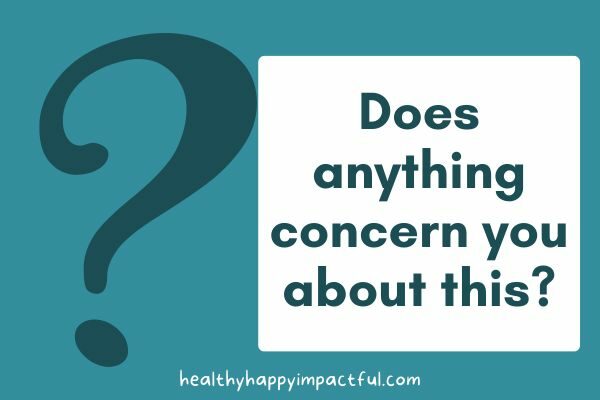
119. Does anything concern you about this?
120. When is this acceptable?
121. When is this not acceptable (or appropriate)?
122. What is one thing that would have changed everything?
123. When do you think this will benefit _________ (the company, society, etc.)?
124. When a disagreement happens at work, what do you do?
125. Is this goal achievable ?
126. How does your work experience help you fill this role?
127. Has this ever been done before? When?
128. What would need to happen for you to reconsider?
129. When will we need this?
130. What skills fit well with this position?
Related: Fun Rapid Fire Questions To Ask
Examples of Kids Critical Thinking Questions: By Word
Another way to split up your critical thinking questions is by word.
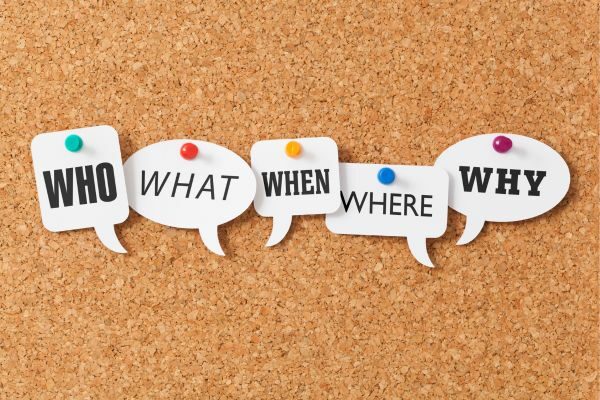
- Who is most directly affected by this decision?
- Who is the protagonist? Who is the antagonist?
- Who was the most important character?
- Who was a supporting character that was essential to the storyline?
- What is the problem you are trying to solve?
- What information is important to know about this before forming an opinion?
- What was the point of _________?
- When is it a good time to stop (or take a breather)?
- When should you know the answer?
- When will it be time for this? How do you know?
- When will this be critical?
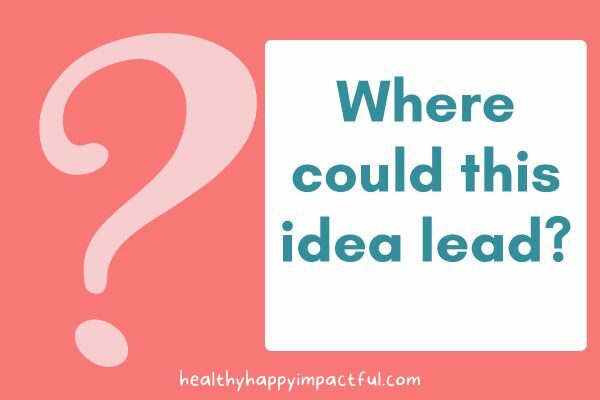
- Where can you go to ask for help?
- Where can you find a good solution? Or information that helps you solve this problem?
- Where could this idea lead?
- Why has this issue come out into the spotlight?
- Why do you think ______ acts that way?
- Why is _______ happening, but ________ is not?
- How else could we have done that?
- How else could this be handled?
- How would you have responded in this situation?
- Fun Hobbies For Families To Do
- Best Family Challenge Ideas
More Ways To Encourage Critical Thinking In Kids
Want to go beyond questions? No problem! Here are other practical ways to build this crucial skill:

Change your questions to them.
Turn your normal yes or no questions to more open ended questions.
Example: Instead of “How was your day?” go with “What was the most interesting part of your school day today?”
Refrain from stepping in.
These days parents feel like they should be fixing their kids’ problems constantly.
Instead, hold back and force your child to problem-solve on their own. Ask questions and guide them through the problem, but let them know that they are in charge of finding their own solutions.
Play Games And Do Activities That Promote Critical Thinking
Here are a few great ones!
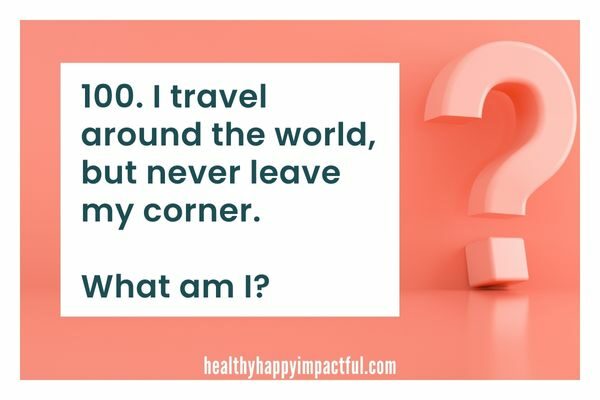
Two Truths & A Lie Game – The players have to decide which statements are true and which one is not. This game is great for learning to read body language too!
Good Debate Topics For Kids – Nothing builds quick critical thinking like a lively debate.
Riddles: What Am I? – These word riddles help kids think through different possibilities.
Guess The Animal Riddles for Kids – More riddles all about animals to get kids thinking.
Encourage creativity.
Provide your child with opportunities to use their imagination.
Sometimes, all this takes is getting your child off screens and outside playing with sticks!
Encourage them to build something , make up a new game, and think outside the box whenever possible.
Let them fiddle with things.
My son has a very “why” brain and loves to mess with stuff. It used to embarrass me when we were around others.
But, one day, my husband and I realized that his “working things out” isn’t bad. We just needed to teach him in what context it is appropriate. Now he fiddles with everything, and it is amazing to watch his mind work.
Let them question.
The same goes for questions. They should be challenging assumptions and questioning the world around them. Too many people take for granted the things that they hear and read. Teach your child to be different.
Promote Active Listening.
Encourage your child to ask questions to clarify understanding and develop communication skills.
Examples: “What I hear is _________.” Or, “How do you know _________?”
Try New Things.
Travel. And regularly expose your kids to new ideas and experiences. This helps them see their regular world in a new light.
Think Critically Yourself.
Finally, your child will be much more likely to think critically if they see a parent who does it. So, apply all of these strategies to yourself as well.
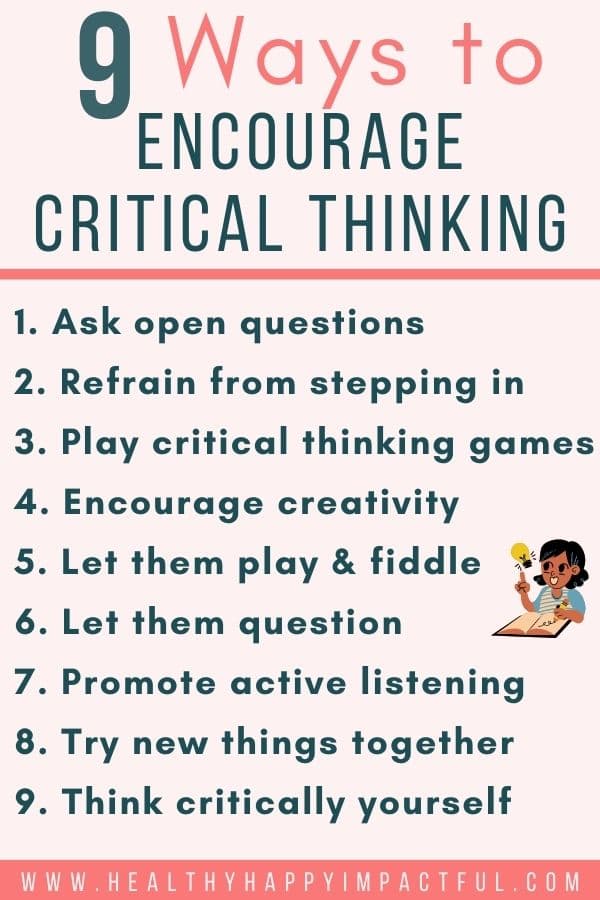
To Consider With Critical Thinking Questions For Kids
Teaching children to form their own opinions is how we build a generation of people that will analyze, evaluate, and make decisions for the betterment of the world.
It’s not just important. It’s critical to our future as a society.
More family-friendly posts you’ll love…
- Telephone Game Phrases & Statement Ideas
- Ice Breaker Kids & Teen Games
- Best Books List For 4 Year Olds
Creative Kids Critical Thinking Questions For Students
Jennifer is the founder and chief editor of Healthy Happy Impactful®. She believes that living, loving, and connecting deeply are the foundation for a good life. She holds a degree in education and is a mom to 3 kids.
- SUGGESTED TOPICS
- The Magazine
- Newsletters
- Managing Yourself
- Managing Teams
- Work-life Balance
- The Big Idea
- Data & Visuals
- Reading Lists
- Case Selections
- HBR Learning
- Topic Feeds
- Account Settings
- Email Preferences
Critical Thinking Is About Asking Better Questions
- John Coleman

Six practices to sharpen your inquiry.
Critical thinking is the ability to analyze and effectively break down an issue in order to make a decision or find a solution. At the heart of critical thinking is the ability to formulate deep, different, and effective questions. For effective questioning, start by holding your hypotheses loosely. Be willing to fundamentally reconsider your initial conclusions — and do so without defensiveness. Second, listen more than you talk through active listening. Third, leave your queries open-ended, and avoid yes-or-no questions. Fourth, consider the counterintuitive to avoid falling into groupthink. Fifth, take the time to stew in a problem, rather than making decisions unnecessarily quickly. Last, ask thoughtful, even difficult, follow-ups.
Are you tackling a new and difficult problem at work? Recently promoted and trying to both understand your new role and bring a fresh perspective? Or are you new to the workforce and seeking ways to meaningfully contribute alongside your more experienced colleagues? If so, critical thinking — the ability to analyze and effectively break down an issue in order to make a decision or find a solution — will be core to your success. And at the heart of critical thinking is the ability to formulate deep, different, and effective questions.
- JC John Coleman is the author of the HBR Guide to Crafting Your Purpose . Subscribe to his free newsletter, On Purpose , follow him on Twitter @johnwcoleman, or contact him at johnwilliamcoleman.com.
Partner Center
- Skip to primary navigation
- Skip to main content
- Skip to primary sidebar
- Skip to footer
Don't Miss a Post! Subscribe
- Guest Posts

- Educational AI
- Edtech Tools
- Edtech Apps
- Teacher Resources
- Special Education
- Edtech for Kids
- Buying Guides for Teachers

Educators Technology
Innovative EdTech for teachers, educators, parents, and students
Examples of Critical Thinking Questions for Students
By Med Kharbach, PhD | Last Update: November 10, 2023
Critical thinking is an essential cognitive skill that entails the ability to reason, analyze, synthesize, and evaluate information. It goes beyond mere acquisition of knowledge. Instead, it involves deep, reflective thought, demanding us to question our assumptions, weigh evidence, and consider consequences. It’s about making clear, reasoned judgments. In essence, critical thinking is thinking about thinking, in a manner that allows us to improve the quality of our thinking.

In our daily lives, critical thinking helps us better understand ourselves, other people, and the world around us. It aids in problem solving, aids in the formation of beliefs and opinions, and encourages curiosity and creativity.
For example, when you’re faced with a major decision like purchasing a house, critical thinking enables you to weigh the pros and cons, assess the credibility of your sources of information, consider alternative options, and make a well-informed decision.
In professional situations, critical thinking is equally important. It helps us navigate complex work situations, make informed decisions, solve problems efficiently, and think creatively. For instance, if a company faces a decline in sales, critical thinking would help diagnose the root cause of the issue, evaluate different strategies to address the problem, and make effective decisions to rectify the situation.
The importance of critical thinking is particularly crucial for students. It provides them with the necessary skills to understand complex concepts, evaluate the credibility of sources, engage in thoughtful discussions, and develop reasoned arguments. It lays the foundation for lifelong learning and the ability to adapt to an ever-changing world.
This brings us to the concept of critical thinking questions . These are questions that are specifically designed to promote critical thinking. They go beyond factual inquiries, prompting individuals to analyze, synthesize, apply, and evaluate information. Critical thinking questions challenge the conventional wisdom and encourage individuals to think deeper, questioning the why’s and how’s.
They serve as a tool to spark intellectual engagement and stimulate thoughtful and reflective responses. As we delve further into this blog post, we will explore different types of critical thinking questions and how they can be applied in various contexts.
Related: Best TED Ed Lessons on Critical Thinking
Tips on Formulating Critical Thinking Questions
Creating good critical thinking questions involves understanding the basics of inquiry and knowing how to stimulate higher order thinking. Here are some tips and steps on formulating effective critical thinking questions:
Characteristics of Good Critical Thinking Questions:
- Open-Ended: Good critical thinking questions are typically open-ended, meaning they don’t have a single, simple answer. They invite students to think deeply and come up with their unique insights.
- Thought-Provoking: Effective questions challenge assumptions and encourage students to think creatively and critically. They provoke curiosity and exploration.
- Promote Discussion: The questions should stimulate meaningful discussions. The responses to these questions should not end the conversation, but rather, foster a deeper exploration of the topic.
- Clear and Understandable: The question should be framed in such a way that it is clear and easy to understand. Confusing questions can deter students from critical thinking.
Steps to Create Effective Critical Thinking Questions:
- Identify Your Learning Goals: Start by figuring out what you want your students to learn or achieve. Your question should align with these learning goals.
- Consider the Cognitive Level: Depending on the depth of thinking you want to stimulate, frame your questions accordingly. For instance, for higher order thinking, you might want to ask analysis, evaluation, or creation questions.
- Draft Your Question: Begin drafting your question. Remember, the best questions are open-ended and require more than a yes or no answer.
- Refine Your Question: Review your question. Is it clear? Does it promote discussion? Does it align with your learning goals? Refine as necessary.
- Test Your Question: Try out your question with a few students or colleagues to see if it stimulates the kind of discussion you’re hoping for. Be open to further refining your question based on the results.
Keep in mind that the goal of asking questions is not to ‘stump’ the students, but to promote intellectual engagement and thought. The best questions often lead to more questions, igniting a passion for learning and exploration.
Types of critical thinking questions
Critical thinking questions can be divided into the following categories:
1. Analysis Questions
Analysis questions ask the respondent to break a concept or idea into its component parts for examination. These questions can help uncover underlying structures, patterns, or meanings. They often involve words like “compare”, “contrast”, “classify”, “divide”, etc.
Example: “Compare the political ideologies of democratic socialism and laissez-faire capitalism. What are the similarities and differences between them?”
2. Evaluation Questions
Evaluation questions call for the respondent to make a judgment about the value of something, based on defined criteria. They often use terms like “critique”, “justify”, “validate”, “defend”, etc.
Example: “Evaluate the effectiveness of the government’s pandemic response measures. What were the successes and shortcomings?”
3. Inference Questions
Inference questions require the respondent to go beyond what is explicitly stated and make logical conclusions or predictions based on the information provided. Key words often include “infer”, “deduce”, “predict”, “conclude”, etc.
Example: “Given the recent surge in online shopping trends, what can you infer about the future of brick-and-mortar retail stores?”
4. Application Questions
Application questions involve applying knowledge or concepts to new situations or contexts. These questions often involve “applying”, “utilizing”, “implementing”, or “executing” learned knowledge.
Example: “How would you apply the principles of conflict resolution that we studied to resolve a disagreement in your workplace?”
5. Synthesis Questions
Synthesis questions invite the respondent to combine different pieces of information, ideas, or concepts to form a new whole or propose a solution. Words often associated with these questions are “design”, “formulate”, “propose”, “create”, etc.
Example: “Based on your understanding of climate change and renewable technologies, propose a comprehensive strategy for a city to reduce its carbon footprint.”
These types of questions, when used in the appropriate contexts, can help foster a deep level of understanding and stimulate higher-level thinking.
Examples of Critical thinking Questions
Here are some examples of critical questions that you can use to stimulate students’ critical thinking skills, encouraging them to analyze, evaluate, and create new ideas based on what they’ve learned.
- What do you think would happen if…?
- Can you explain why…?
- How would you solve this problem using different strategies?
- Can you compare and contrast these two concepts?
- How can you demonstrate your understanding of this concept in a different way?
- How would you categorize these items, and why did you choose to do it that way?
- What patterns or connections do you see in the information provided?
- How might you interpret these findings from another perspective?
- Can you design a…to…?
- How would you prove or disprove this statement?
- How can we improve…?
- What would be the consequences if…?
- Can you predict the outcome if…?
- What is the relationship between…?
- How can this be applied to other situations?
- What are the possible solutions for…?
- Why do you think that… happened?
- How can we test the validity of…?
- What alternative would you suggest for…?
- How can you illustrate this concept in a diagram?
- What would you recommend, and why?
- How is this similar to…?
- Can you make a general rule about…?
- How would you evaluate…?
- What evidence do you have for your claim?
- What are the implications of…?
- How does this contradict or confirm your understanding of…?
- Can you think of an example where…?
- How would you justify…?
- What do you think is the significance of…?
In conclusion, critical thinking questions are an indispensable tool for stimulating and nurturing the intellectual capabilities of students. They’re not just questions, but sparks that ignite the curiosity, analytical ability, and problem-solving skills in a learner. They invite students to dig deeper, challenge their preconceptions, and engage with material on a more profound level.
These questions play a pivotal role in taking learning beyond the simple absorption of facts into the realm of true understanding and application. They prepare students for the complexities of the real world, honing their ability to analyze situations, make decisions, and innovate solutions.
As educators and teachers, fostering this skill in students through the strategic use of critical thinking questions should be a top priority. So, let’s continue to question, to probe, and to encourage our students to do the same, for it’s in the exploration of these questions that true learning lies.

Join our mailing list
Never miss an EdTech beat! Subscribe now for exclusive insights and resources .

Meet Med Kharbach, PhD
Dr. Med Kharbach is an influential voice in the global educational technology landscape, with an extensive background in educational studies and a decade-long experience as a K-12 teacher. Holding a Ph.D. from Mount Saint Vincent University in Halifax, Canada, he brings a unique perspective to the educational world by integrating his profound academic knowledge with his hands-on teaching experience. Dr. Kharbach's academic pursuits encompass curriculum studies, discourse analysis, language learning/teaching, language and identity, emerging literacies, educational technology, and research methodologies. His work has been presented at numerous national and international conferences and published in various esteemed academic journals.

Join our email list for exclusive EdTech content.

A Crash Course in Critical Thinking
What you need to know—and read—about one of the essential skills needed today..
Posted April 8, 2024 | Reviewed by Michelle Quirk
- In research for "A More Beautiful Question," I did a deep dive into the current crisis in critical thinking.
- Many people may think of themselves as critical thinkers, but they actually are not.
- Here is a series of questions you can ask yourself to try to ensure that you are thinking critically.
Conspiracy theories. Inability to distinguish facts from falsehoods. Widespread confusion about who and what to believe.
These are some of the hallmarks of the current crisis in critical thinking—which just might be the issue of our times. Because if people aren’t willing or able to think critically as they choose potential leaders, they’re apt to choose bad ones. And if they can’t judge whether the information they’re receiving is sound, they may follow faulty advice while ignoring recommendations that are science-based and solid (and perhaps life-saving).
Moreover, as a society, if we can’t think critically about the many serious challenges we face, it becomes more difficult to agree on what those challenges are—much less solve them.
On a personal level, critical thinking can enable you to make better everyday decisions. It can help you make sense of an increasingly complex and confusing world.
In the new expanded edition of my book A More Beautiful Question ( AMBQ ), I took a deep dive into critical thinking. Here are a few key things I learned.
First off, before you can get better at critical thinking, you should understand what it is. It’s not just about being a skeptic. When thinking critically, we are thoughtfully reasoning, evaluating, and making decisions based on evidence and logic. And—perhaps most important—while doing this, a critical thinker always strives to be open-minded and fair-minded . That’s not easy: It demands that you constantly question your assumptions and biases and that you always remain open to considering opposing views.
In today’s polarized environment, many people think of themselves as critical thinkers simply because they ask skeptical questions—often directed at, say, certain government policies or ideas espoused by those on the “other side” of the political divide. The problem is, they may not be asking these questions with an open mind or a willingness to fairly consider opposing views.
When people do this, they’re engaging in “weak-sense critical thinking”—a term popularized by the late Richard Paul, a co-founder of The Foundation for Critical Thinking . “Weak-sense critical thinking” means applying the tools and practices of critical thinking—questioning, investigating, evaluating—but with the sole purpose of confirming one’s own bias or serving an agenda.
In AMBQ , I lay out a series of questions you can ask yourself to try to ensure that you’re thinking critically. Here are some of the questions to consider:
- Why do I believe what I believe?
- Are my views based on evidence?
- Have I fairly and thoughtfully considered differing viewpoints?
- Am I truly open to changing my mind?
Of course, becoming a better critical thinker is not as simple as just asking yourself a few questions. Critical thinking is a habit of mind that must be developed and strengthened over time. In effect, you must train yourself to think in a manner that is more effortful, aware, grounded, and balanced.
For those interested in giving themselves a crash course in critical thinking—something I did myself, as I was working on my book—I thought it might be helpful to share a list of some of the books that have shaped my own thinking on this subject. As a self-interested author, I naturally would suggest that you start with the new 10th-anniversary edition of A More Beautiful Question , but beyond that, here are the top eight critical-thinking books I’d recommend.
The Demon-Haunted World: Science as a Candle in the Dark , by Carl Sagan
This book simply must top the list, because the late scientist and author Carl Sagan continues to be such a bright shining light in the critical thinking universe. Chapter 12 includes the details on Sagan’s famous “baloney detection kit,” a collection of lessons and tips on how to deal with bogus arguments and logical fallacies.

Clear Thinking: Turning Ordinary Moments Into Extraordinary Results , by Shane Parrish
The creator of the Farnham Street website and host of the “Knowledge Project” podcast explains how to contend with biases and unconscious reactions so you can make better everyday decisions. It contains insights from many of the brilliant thinkers Shane has studied.
Good Thinking: Why Flawed Logic Puts Us All at Risk and How Critical Thinking Can Save the World , by David Robert Grimes
A brilliant, comprehensive 2021 book on critical thinking that, to my mind, hasn’t received nearly enough attention . The scientist Grimes dissects bad thinking, shows why it persists, and offers the tools to defeat it.
Think Again: The Power of Knowing What You Don't Know , by Adam Grant
Intellectual humility—being willing to admit that you might be wrong—is what this book is primarily about. But Adam, the renowned Wharton psychology professor and bestselling author, takes the reader on a mind-opening journey with colorful stories and characters.
Think Like a Detective: A Kid's Guide to Critical Thinking , by David Pakman
The popular YouTuber and podcast host Pakman—normally known for talking politics —has written a terrific primer on critical thinking for children. The illustrated book presents critical thinking as a “superpower” that enables kids to unlock mysteries and dig for truth. (I also recommend Pakman’s second kids’ book called Think Like a Scientist .)
Rationality: What It Is, Why It Seems Scarce, Why It Matters , by Steven Pinker
The Harvard psychology professor Pinker tackles conspiracy theories head-on but also explores concepts involving risk/reward, probability and randomness, and correlation/causation. And if that strikes you as daunting, be assured that Pinker makes it lively and accessible.
How Minds Change: The Surprising Science of Belief, Opinion and Persuasion , by David McRaney
David is a science writer who hosts the popular podcast “You Are Not So Smart” (and his ideas are featured in A More Beautiful Question ). His well-written book looks at ways you can actually get through to people who see the world very differently than you (hint: bludgeoning them with facts definitely won’t work).
A Healthy Democracy's Best Hope: Building the Critical Thinking Habit , by M Neil Browne and Chelsea Kulhanek
Neil Browne, author of the seminal Asking the Right Questions: A Guide to Critical Thinking, has been a pioneer in presenting critical thinking as a question-based approach to making sense of the world around us. His newest book, co-authored with Chelsea Kulhanek, breaks down critical thinking into “11 explosive questions”—including the “priors question” (which challenges us to question assumptions), the “evidence question” (focusing on how to evaluate and weigh evidence), and the “humility question” (which reminds us that a critical thinker must be humble enough to consider the possibility of being wrong).

Warren Berger is a longtime journalist and author of A More Beautiful Question .
- Find a Therapist
- Find a Treatment Center
- Find a Support Group
- International
- New Zealand
- South Africa
- Switzerland
- Asperger's
- Bipolar Disorder
- Chronic Pain
- Eating Disorders
- Passive Aggression
- Personality
- Goal Setting
- Positive Psychology
- Stopping Smoking
- Low Sexual Desire
- Relationships
- Child Development
- Therapy Center NEW
- Diagnosis Dictionary
- Types of Therapy

Understanding what emotional intelligence looks like and the steps needed to improve it could light a path to a more emotionally adept world.
- Coronavirus Disease 2019
- Affective Forecasting
- Neuroscience

More results...
Questions–and Critical Thinking in Discussions

Image by nugroho dwi hartawan from Pixabay
George Winston taught an upper-level economics course on current issues. The course had a major discussion component and today’s class was the first session with students in their small-group discussion teams. George started class by saying: “Today I want you to discuss the impact of electric vehicles on our economy.”
The discussions were spirited, but superficial. The discussion comments were as ill-informed as what you might expect from a cable news show. Winston was embarrassed that students who were getting an economics degree would be so shallow in their thinking. After 15 minutes, he called for a pause.
“In your discussion groups, I really expect you to bring the lens of your economics major to the discussion. I expect you to go deeper. Unfortunately, what I kept hearing were great examples of common biases. I heard:
- Confirmation biases – refusing to consider points of view other than your own
- Anchoring biases – focusing only on one issue
- Misinformation biases – many of you were circulating nonfactual or erroneous statements about electric vehicles, whether these bits of misinformation came from supporters or opponents of electric vehicles
- Halo biases – your opinions are shaped by an influencer, not on evidence or careful analytical thinking
- Optimistic biases – you were dismissing any negative consequences that might go against your position.
“Here’s what I want your group to do in the time remaining today. I want you to think of all the questions that we should be asking ourselves about electric vehicles, especially in terms of the economic impacts. You don’t need the answers at this point, just the questions. One way to do this is to imagine the questions for the entire supply chain related to the life cycle for an electric vehicle, from sourcing the raw materials to the final disposal of the vehicles.”
The contrast in the quality of the discussion couldn’t have been more evident. Focusing on questions helped remove the narrowing effect of biases. The questions also sparked curiosity (e.g. what happens to the power grid when everyone recharges their battery at the same time when they get home from work?).
When the class ended, Winston made one final comment: “I hope this class showed you how important it is to think of every discussion from now on as an exercise in critical thinking. If you start with questions, you are more likely to be objective in your thinking.”
If you’re interested in activities to foster critical thinking in classroom discussions, check out Critical Collaboration Module in the Interactivity Foundation’s Collaborative Discussion Toolkit . You might also find the Promoting Curiosity activity to be helpful for discussions that focus on generating questions.
“ The important thing is not to stop questioning. Curiosity has its own reason for existence. ” – Albert Einstein
This post is part of our “Think About” education series. These posts are based on composites of real-world experiences, with some details changed for the sake of anonymity. New posts appear Wednesday afternoons.
Recent Posts
- Become a Collaborative Discussion Coach
- Just Imagine…An Inclusive and Ever-Evolving Technology
- Just Imagine…A Thousand Words
- Just Imagine…Our National Parks, a Gift for All of Us?
- Just Imagine…Gleaning: an Old Word that Remains Relevant
Have a language expert improve your writing
Run a free plagiarism check in 10 minutes, generate accurate citations for free.
- Knowledge Base
- Working with sources
- What Is Critical Thinking? | Definition & Examples
What Is Critical Thinking? | Definition & Examples
Published on May 30, 2022 by Eoghan Ryan . Revised on May 31, 2023.
Critical thinking is the ability to effectively analyze information and form a judgment .
To think critically, you must be aware of your own biases and assumptions when encountering information, and apply consistent standards when evaluating sources .
Critical thinking skills help you to:
- Identify credible sources
- Evaluate and respond to arguments
- Assess alternative viewpoints
- Test hypotheses against relevant criteria
Table of contents
Why is critical thinking important, critical thinking examples, how to think critically, other interesting articles, frequently asked questions about critical thinking.
Critical thinking is important for making judgments about sources of information and forming your own arguments. It emphasizes a rational, objective, and self-aware approach that can help you to identify credible sources and strengthen your conclusions.
Critical thinking is important in all disciplines and throughout all stages of the research process . The types of evidence used in the sciences and in the humanities may differ, but critical thinking skills are relevant to both.
In academic writing , critical thinking can help you to determine whether a source:
- Is free from research bias
- Provides evidence to support its research findings
- Considers alternative viewpoints
Outside of academia, critical thinking goes hand in hand with information literacy to help you form opinions rationally and engage independently and critically with popular media.
Prevent plagiarism. Run a free check.
Critical thinking can help you to identify reliable sources of information that you can cite in your research paper . It can also guide your own research methods and inform your own arguments.
Outside of academia, critical thinking can help you to be aware of both your own and others’ biases and assumptions.

Academic examples
However, when you compare the findings of the study with other current research, you determine that the results seem improbable. You analyze the paper again, consulting the sources it cites.
You notice that the research was funded by the pharmaceutical company that created the treatment. Because of this, you view its results skeptically and determine that more independent research is necessary to confirm or refute them. Example: Poor critical thinking in an academic context You’re researching a paper on the impact wireless technology has had on developing countries that previously did not have large-scale communications infrastructure. You read an article that seems to confirm your hypothesis: the impact is mainly positive. Rather than evaluating the research methodology, you accept the findings uncritically.
Nonacademic examples
However, you decide to compare this review article with consumer reviews on a different site. You find that these reviews are not as positive. Some customers have had problems installing the alarm, and some have noted that it activates for no apparent reason.
You revisit the original review article. You notice that the words “sponsored content” appear in small print under the article title. Based on this, you conclude that the review is advertising and is therefore not an unbiased source. Example: Poor critical thinking in a nonacademic context You support a candidate in an upcoming election. You visit an online news site affiliated with their political party and read an article that criticizes their opponent. The article claims that the opponent is inexperienced in politics. You accept this without evidence, because it fits your preconceptions about the opponent.
There is no single way to think critically. How you engage with information will depend on the type of source you’re using and the information you need.
However, you can engage with sources in a systematic and critical way by asking certain questions when you encounter information. Like the CRAAP test , these questions focus on the currency , relevance , authority , accuracy , and purpose of a source of information.
When encountering information, ask:
- Who is the author? Are they an expert in their field?
- What do they say? Is their argument clear? Can you summarize it?
- When did they say this? Is the source current?
- Where is the information published? Is it an academic article? Is it peer-reviewed ?
- Why did the author publish it? What is their motivation?
- How do they make their argument? Is it backed up by evidence? Does it rely on opinion, speculation, or appeals to emotion ? Do they address alternative arguments?
Critical thinking also involves being aware of your own biases, not only those of others. When you make an argument or draw your own conclusions, you can ask similar questions about your own writing:
- Am I only considering evidence that supports my preconceptions?
- Is my argument expressed clearly and backed up with credible sources?
- Would I be convinced by this argument coming from someone else?
If you want to know more about ChatGPT, AI tools , citation , and plagiarism , make sure to check out some of our other articles with explanations and examples.
- ChatGPT vs human editor
- ChatGPT citations
- Is ChatGPT trustworthy?
- Using ChatGPT for your studies
- What is ChatGPT?
- Chicago style
- Paraphrasing
Plagiarism
- Types of plagiarism
- Self-plagiarism
- Avoiding plagiarism
- Academic integrity
- Consequences of plagiarism
- Common knowledge
The only proofreading tool specialized in correcting academic writing - try for free!
The academic proofreading tool has been trained on 1000s of academic texts and by native English editors. Making it the most accurate and reliable proofreading tool for students.

Try for free
Critical thinking refers to the ability to evaluate information and to be aware of biases or assumptions, including your own.
Like information literacy , it involves evaluating arguments, identifying and solving problems in an objective and systematic way, and clearly communicating your ideas.
Critical thinking skills include the ability to:
You can assess information and arguments critically by asking certain questions about the source. You can use the CRAAP test , focusing on the currency , relevance , authority , accuracy , and purpose of a source of information.
Ask questions such as:
- Who is the author? Are they an expert?
- How do they make their argument? Is it backed up by evidence?
A credible source should pass the CRAAP test and follow these guidelines:
- The information should be up to date and current.
- The author and publication should be a trusted authority on the subject you are researching.
- The sources the author cited should be easy to find, clear, and unbiased.
- For a web source, the URL and layout should signify that it is trustworthy.
Information literacy refers to a broad range of skills, including the ability to find, evaluate, and use sources of information effectively.
Being information literate means that you:
- Know how to find credible sources
- Use relevant sources to inform your research
- Understand what constitutes plagiarism
- Know how to cite your sources correctly
Confirmation bias is the tendency to search, interpret, and recall information in a way that aligns with our pre-existing values, opinions, or beliefs. It refers to the ability to recollect information best when it amplifies what we already believe. Relatedly, we tend to forget information that contradicts our opinions.
Although selective recall is a component of confirmation bias, it should not be confused with recall bias.
On the other hand, recall bias refers to the differences in the ability between study participants to recall past events when self-reporting is used. This difference in accuracy or completeness of recollection is not related to beliefs or opinions. Rather, recall bias relates to other factors, such as the length of the recall period, age, and the characteristics of the disease under investigation.
Cite this Scribbr article
If you want to cite this source, you can copy and paste the citation or click the “Cite this Scribbr article” button to automatically add the citation to our free Citation Generator.
Ryan, E. (2023, May 31). What Is Critical Thinking? | Definition & Examples. Scribbr. Retrieved April 12, 2024, from https://www.scribbr.com/working-with-sources/critical-thinking/
Is this article helpful?

Eoghan Ryan
Other students also liked, student guide: information literacy | meaning & examples, what are credible sources & how to spot them | examples, applying the craap test & evaluating sources, unlimited academic ai-proofreading.
✔ Document error-free in 5minutes ✔ Unlimited document corrections ✔ Specialized in correcting academic texts

- Search Search Search …
- Search Search …
47 Critical Thinking Questions for High School Students

Critical thinking is defined as analyzing and thinking objectively about an issue to form a judgment. Critical thinking skills are important for high school students because they encourage decision-making based on logic and reason, which will serve them well in adulthood.
In fact, it has been proven that having critical thinking skills leads to success in interpersonal, financial, and business endeavors and serves to protect against negative outcomes.
Critical thinking questions are those that encourage the development of the following skills:
- Problem-solving
- Communication
- Open-mindedness
Let’s review some of the best questions that encourage critical thinking in high school students .
If you could make your own country, what would it look like? What rules would your citizens follow?
If you could go back in time two years and give your younger self advice, what advice would you give?
If you found out you only had 24 hours left to live, what would you decide to do with your last day on earth?
If you were offered the opportunity to get on a spaceship bound for a distant planet, and you would be one of the first colonizers, would you do it?
If a train was heading down a track without brakes and you had the switch that would turn it to either one of two tracks, and there was a baby on one track and an old woman on the other, who would you choose to let live? Why?
If everyone in the world stopped using social media, would it be a good thing or a bad thing? Defend your answer.
If your best friend was doing something dangerous that could kill them or put them in jail, would you tell someone even if it meant never speaking to them again?
Should the voting age be lowered to 16? Why or why not?
Should euthanasia be legal? Why or why not?
Question 10
Is it better to take one life in order to save 5 lives? What about 10? 20?
Question 11
If you had the power to solve one major problem on earth, what problem would you solve?
Question 12
If you could transport yourself instantly anywhere in the world, what place would you choose?
Question 13
If you were stranded on a desert island, what item would you choose to bring with you, provided you would have an endless supply of food and water?
Question 14
Should the drinking age be lowered to 18? Why or why not?
Question 15
If you could spend one day with any person on earth, alive or dead, who would it be and why?
Question 16
Is it more important to have a strong military or universal healthcare? Why or why not?
Question 17
What defines adulthood? When does adulthood begin?
Question 18
Which is more important – solving climate change or solving world hunger?
Question 19
Would you rather be blind or deaf? Why?
Question 20
How would you describe a tree without using the words green, branches, or leaves?
Question 21
If you could describe the color red to a blind person, how would you describe it? What about the color blue?
Question 22
If you had the ability to transform into any animal at any time you wanted, what animal would you choose and why?
Question 23
If you could live in any historical time period, which time period would you choose and why?
Question 24
Would you rather die by falling off a skyscraper or being buried in a landslide? Why?
Question 25
How does someone become a good person? Can a bad person change into a good person? How?
Question 26
Would you rather to never have to eat or never have to sleep? Why?
Question 27
Is it better to have 1 million dollars in the bank or donate 10 million dollars to charity? Why or why not?
Question 28
How would you describe an airplane to someone who had never seen or heard of one?
Question 29
Is it better to be ignored or gossiped about? Why?
Question 30
What makes humans more important than animals?
Question 31
Is murder every justifiable? Why or why not?
Question 32
Is the death penalty immoral? Why or not?
Question 33
What characteristics make a good leader?
Question 34
If ignorance ever an excuse for breaking the law? Why or why not?
Question 35
What is more important in life: love, health, or money?
Question 36
Is it better to be feared or loved? Why?
Question 37
If you had the chance to travel through time and change one historical event, what event would you change and why? How would you change it?
Question 38
If you suddenly had a life expectancy of 500 years, would you change the way you live your life? What about if your life expectancy dropped 10 years?
Question 39
Think about the birth order with you and your siblings, if you have any. Would you rather change your birth order or remain where you are?
Question 40
If you had five minutes to defend the human race against an alien civilization who were going to destroy humanity, what would you say?
Question 41
Would you want to live forever? Why or why not?
Question 42
Is it the responsibility of wealthy countries to help impoverished countries? Why or why not?
Question 43
If you could change one rule in your family, what rule would it be and why?
Question 44
Do someone’s actions impact their value as a person, such as serial killers?
Question 45
How do you define evil?
Question 46
Is it the government’s job to ban harmful substances like drugs or alcohol, or is it the citizens’ responsibility to look after their own health?
Question 47
Should people be required to take a test before having a baby? Why or why not?
https://www.uopeople.edu/blog/why-is-critical-thinking-important/
https://www.futurelearn.com/info/courses/how-to-develop-critical-thinking-skills/0/steps/335512#:~:text=We%20develop%20specific%20techniques%20that,%2C%20independently%2C%20and%20effectively.%E2%80%9D
You may also like
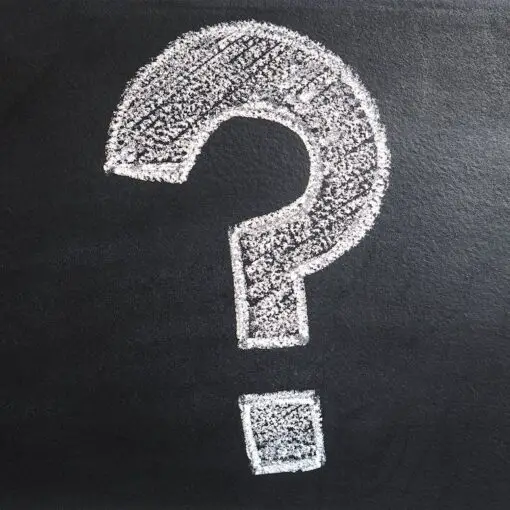
Unlocking the Power of Critical Thinking (Questioning Assumptions)
In the quest for personal and professional growth, critical thinking is a fundamental skill that can revolutionize one’s problem-solving abilities, decision-making processes, […]

Critical Thinking in 2022: The Key To Growing and Maintaining Knowledge
Although the major focus on critical thinking has only been popular in the last 100 years or so, you can see hints […]

What is Associative Thinking and Why it Matters in Today’s Workplace
Associative thinking is a cognitive process that allows the mind to connect seemingly unrelated concepts and ideas. This type of thinking is […]

The Role of Intuition in Critical Thinking: Unraveling the Connection
Intuition plays a significant role in the process of critical thinking. As an innate ability, intuition allows individuals to make decisions and […]
102 Thought-Provoking Questions to Ask About Life

Have you ever posed a thought-provoking question to your child?
Do you want to train your students to question well , but you’re not sure how—or which questions to ask?
Today, I want to share a list of thought-provoking questions to help you kickstart their critical thinking journey.
Think of these queries as discussion topics that you can handpick according to their age and level of understanding.
Deep Thought-Provoking Questions About Life

Some of the best thought-provoking topics are those that examine our morals, ethics, and opinions on a life well-lived.
The right questions can even help us reflect on our own journeys—and prompt us to correct course as needed.
Next time your mind is free to roam, here are some good questions to make you think about life.
You may notice that some are similar to those asked in our 240 Philosophical Questions post .
That’s because philosophy pursues a deep understanding of life, and its nature is naturally thought-provoking.
- Is it better to live to a ripe old age with little excitement or lead an adventurous but short life?
- What does it mean to be free?
- What does it mean to be successful in life?
- Can perfection ever become reality?
- Do you think the world would be better or worse if everyone thought the same way?
- If you could take away all negative feelings, would this be a good or bad thing?
- Is everyone’s life of equal value, or is it more important to protect some lives than others?
- Is it okay to break the law if there are extenuating circumstances?
- Which is the better choice—fight or flight?
- If you had all the time in the world, what would you fill it with?
- If nobody cared what you did—good or bad—how would you live your life differently than you do now?
- Have you ever impulsively acted in a way that changed your life forever?
- If you could choose a life of ease, would you?
- What wise advice do you wish you had followed?
- Is it okay to “fake it until you make it,” or is it more important to be genuine?
- Can a person be true to him or herself while also bending to the needs of others?
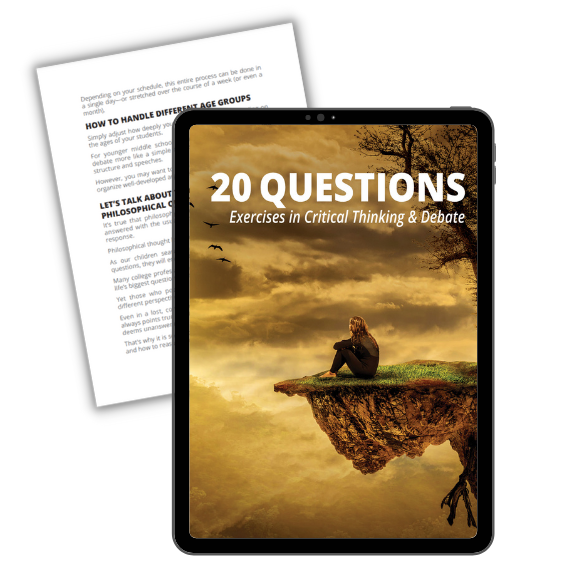
Get a Question-Based Critical Thinking Exercise—Free!
Introduce critical thinking gently & easily with thought-provoking exercises.
Thoughtful Questions for Friends and Family
Internal pondering of thought-provoking questions can help you examine your own life better.
What about the people around you?

Do you know them as well as you’d like?
How a person answers tough questions can reveal much about him or her. Their answers may even lead you to question your own beliefs.
That’s where critical thinking comes to into play.
At the very least, thoughtful questions are far more fascinating than small talk.
While you don’t necessarily want to interrogate your friends, it’s nice to have a few conversation starters to draw from.
Here are some examples of thought-provoking questions to get to know someone:
- Do you enjoy being by yourself?
- Do you ever cave in to peer pressure, even if it’s not what you want to do?
- Do you ever feel misunderstood? When does it happen the most?
- Do you ever show off—even subtly—just to make other people think better of you?
- Do you have any internal rules that you live by no matter what?
- Do you have any real phobias?
- Have you ever experienced something unbelievable—and people think you’re lying about it?
- If there was ever a disaster in your town and everyone had to pitch in to rebuild, what part would you play?
- If you could be like anyone in the world, who would it be?
- If you had to live with only 5 material possessions, what would you choose?
- Are you so competitive that you end up being a sore loser or gloating winner?
- Is there a song whose lyrics speak to you?
- What do you think is the best thing about you?
- What is your most unusual talent?
- What do you want more than anything else?
- What would you keep even if you were offered all the money in the world for it?
- What’s the title of your fictionalized life story? Does the hero live happily ever after?
- When you feel anxious, what place, activity, or person makes you feel better?
- When you’re sick, do you like to be babied or left alone?
Thought-Provoking Questions That Are Funny and Lighthearted

Thoughtful questions don’t have to be so serious.
Whether you need to wake everyone’s minds before school or want to jazz up boring chit-chat, try some thought-provoking conversation starters and icebreakers .
Here are a few fun questions to get you started:
- Where do you think a hamster is trying to go when he’s running on that wheel?
- What animal would you bring back from extinction?
- What’s the weirdest dream you’ve ever had?
- Do cats rule and dogs drool, or do you prefer dogs over cats?
- Speaking of cats, what would your cat be like as a person?
- If you could convince people to believe anything you told them, what story would you create just for fun?
- If you could live in an amusement park, shopping center, or other fun place, which would you choose?
- If you had a chance to meet your clone, would you?
- If you had to choose only two foods to eat for the rest of your life, what would they be?
- If you had to choose two of these—seeing, hearing, or being able to walk—which would you choose and why?
- What is the funniest joke you’ve ever heard?
- What is the best way to start your day?
- What movie or comic book superhero do you most relate to?
- Which storybook character do you wish you could be?
- Which movie villain would you most hate to meet in real life?
- Why are yummy foods bad for you and gross foods good for you?
- Will machines ever totally take over everyone’s manual-labor jobs?
- Would you own an exotic animal if it wasn’t harmful to the animal or yourself? Which one?
- You have one day to spend a million dollars—what do you buy?
- Does pineapple belong on pizza?
- If you had to eat a worm, would you swallow it whole or chew it up?
We also have a post with fun critical thinking questions . Be sure to check it out!
Open Ended Thought-Provoking Questions

Now more than ever, it is critical to teach our children to think on topics that may not have black-and-white answers.
They will face tough issues eventually.
Sadly, the unprepared person is prone to believing false narratives.
Thought-provoking questions for teens and students can nudge them toward thinking carefully about important topics:

Identify Deceptive Lies Disguised as Logic
Our teens may be deceived tomorrow if they don’t learn to discern today!
Try some of these intriguing topics for discussion:
- Do people see you the way you see yourself?
- What is a true friend?
- Would you rather live in an era of the past? Which one?
- If you could outlaw one thing that’s acceptable in our culture right now, what would it be?
- What constitutes “the good life”?
- If you had to live in one place for the rest of your life, where would it be?
- Is there anything you need to pay forward?
- What has been your greatest adventure up to this point?
- What is at the top of your bucket list?
- What first impression do you try to give new people?
- When is it okay to tell a lie?
- What does perfection look like?
- Who has shaped your personality the most?
- Would you rather have work you enjoy or lots of time to do nothing?
- Would you rather walk on the moon or explore the deepest oceans?
- Where do you see yourself in five years? Ten?
- What mistakes have you seen adults around you make that you plan to avoid?
- What does it mean to be an adult?
Questions to Ask About Yourself and the World Around You

When you want your students to ponder their human nature and purpose, existential questions like these are helpful:
- Does the American dream exist?
- Should all crimes be equally punishable, or should circumstances decide the punishment?
- Do you derive energy from nature, manmade environments, or somewhere else?
- What keeps you up at night?
- What legacy do you hope to leave?
- What motivates you most?
- Is one life enough?
- In what ways do you wish you were different? Can you change?
- What’s something you need to do—but haven’t yet—because it scares you?
- What parts of your personality do you hide and why?
- If you could master one thing, what would it be?
- What would a collage of your life include?
- What makes the world a better place?
- In what ways do you fool yourself?
- Are you a producer or consumer?
- Do you think people in the past had it easier or harder than we do now?
- If you had to choose between remembering your past or being able to make new memories in the future, which would you choose?
- If you had a “do-over,” what past event would you spend it on?
- If you had a chance to live in the woods with no access to the internet, would you do it?
- If you had to pick a motto for your life, what would it be?
- What causes two people to “connect”?
- Was the invention of social media a bad idea?
- What brings you joy?
- What do you need most?
- Why are some truths hard to accept?
- What’s holding you back from doing what you want to do?
- What one thing would you eliminate forever if you could?
- Can opinions be wrong?
How to Use: Create Time for a “Question of the Day”
If you’re looking for a way to incorporate deep thought into your homeschool, may I recommend instituting a “Thought-Provoking Question of the Day”?
Simply put, you would choose a time that works best for your family to come together and present a question to ponder.
Provide time for each member to think about the topic and form an answer. Next, discuss the question openly, encouraging everyone to voice their opinion—even if they fear it might seem “silly.”
You’d be amazed how a simple question can spark quality conversation and deep critical thinking.
We created 240 Questions for just this purpose:
About The Author
Jordan Mitchell
Comments are closed.

40 Critical Thinking Questions for High School Students
How is electricity being produced from rainwater or do aliens exist if there are so many discoveries about them? High school students are certain to come across queries that question reality, everyday rules, general human existence, or anything out of nowhere!
Young minds are filled with an amazing potential to explore beyond their capabilities and hidden qualities. While high school students might question the existing realities of life, some students might not be aware of their imagination and thinking capacities. That is why it is important to nurture these growing minds with opportunities to question, understand, analyze, find evidence, and arrive at solutions.
In this case, critical thinking questions act as a helpful way to offer an opportunity to broaden their minds to unlimited knowledge and endless possibilities. When students are given a chance to think beyond the ordinary, they experience a sense of freedom in thinking and expressing their views.
Through critical thinking questions, they receive a wonderful chance to analyze, decode the information, and present their views without being right or wrong. Hence, the below-mentioned questions are drafted in a way to initiate abstract and informative conversations thereby boosting critical thinking.
Brain teasing critical thinking questions for high schoolers
Critical thinking skills are essential for measuring the imagination and creativity of students. High school students are likely to use the new age information and influence of others when processing their thoughts. Hence, the below-mentioned questions are a great way to channel their thoughts in a more positively empowered learning environment.
- Do you think it is okay to give up your life if you had to save someone?
- If you could go to your past, what would you change?
- What is the joy of giving for you?
- What is better – giving or receiving? Why?
- If you can change some rules of the school, which ones would you change and why?
- What if you know your future? What does it look like from your perspective?
- What if you are dragged into a situation where you disagree with others?
- What would you do if you are given a task against your willingness to complete it?
- Would you like to do – go to your past or get to know your future? Why?
- What would you choose, 1 million dollars or a lifetime free education? Why?
- What is more important to you, knowledge or money?
- How can you leverage the benefits of social media and how?
- Do you think animals should be free or kept in a zoo?
- What does life look like on the Earth 100 years from now?
- Imagine a world without mobile phones. What would you do?
- If you could choose any profession in the world, what would you choose? Why?
- Would you rather devote your life to helping others through social activities or invest in building a business?
- What is the most important matter of concern that the world needs to address?
- Do you think the voting of high school students matters in Government concerns? Why?
- Which aspect plays a major role in the success of individuals?
- If you could change any one habit of your parents, what would it be?
- If you could travel to any place in the world, where would you go? Why?
- Imagine the world is facing a major power cut issue. What would you do and how would you face the situation?
- What is more important, offering a home to the needy or offering food to the needy on an everyday basis?
- How does the number 0 change life?
- Should teenagers be allowed to make major life decisions?
- Are friendships real in today’s world?
- Does an influential person always influence others with actions and words?
- If animals could talk to you, who would you choose to talk to?
- What is the difference between happiness and achievements?
- Do you think success is the same as happiness?
- Imagine you have only 24 hours left on Earth. How would you spend it?
- What if you are given the option to reside on another planet? What would you do and how?
- Would you forgive your best friend if he/she commits a crime and is found guilty?
- If your mother and best friend are sinking in two different boats and you have the opportunity to save anyone, who would you choose? Why?
- Imagine you are stranded on an island and have access to 5 things. Which 5 things would you choose?
- Which 3 elements make a stronger nation? Why?
- What are the disadvantages of growing up? How would you tackle them?
- Would you be blind or deaf? Why?
- What if you could donate 50% of your wealth and have free food for life? What would you do?
Critical thinking in students: Why is it crucial?
High schoolers are on their way to exploring various subjects and acquiring knowledge from around the world. In such a phase, students must have the ability to think through things and make the right decision. Critical thinking empowers the brain to analyze and understand situations with complete evidence before concluding. Here’s how critical thinking shapes the life of high schoolers.
1. Develops Problem-Solving Skills
Students are sure to come across everyday problems and issues in their academic journey or personal life. While some students may develop stress, others might ignore it. However, the essence of critical thinking helps students solve these issues with intelligence. Whether it is figuring out about the project or solving an issue between friends, thinking and analyzing the possible solutions makes it easy to tackle situations.
2. Enhances Creativity
The advertisements you see every day often talk about the problem and how a product solves it. That’s exactly why you need to develop critical thinking skills. When you can identify the core issue and arrive at solutions only then can you think out of the box. Critical thinking helps students be creative with their solutions and find a way out amidst challenges.
3. Boosts Decision-Making Skills
With every project, assignment, or topic of your thesis , you need to take many decisions in the learning process. Here, critical thinking skills play a crucial role in helping you analyze, decode and disseminate information before making any decision.
4. Builds Open-mindedness
As growing individuals, it is important to be open-minded towards various problems and their suggestions. People who think critically are more likely to understand situations from different points of view. Hence, developing critical thinking skills helps you accept different perspectives and respect the opinions of others. The skill helps a long way when you need to work in a group on your projects. It is because you become capable of thinking from various perspectives.
5. Goal Setting
Success comes with proper planning and execution of tasks. However, you cannot study history if you are weak at math. Similarly, you cannot aim for a 60% growth in your academics if you have been growing at a pace of 30% in each examination. Critical thinking enables you to think practically and map your way out to reach your goals. When you think critically and practically, you can analyze your strengths and weaknesses thereby setting goals accurately.
Critical thinking indeed plays an essential role in shaping the mindset of students and exposing them to different skills simply by developing this one. As you take advantage of the critical thinking questions, know that it is important to keep questioning students to initiate conversations.
Whether it is reflective questions or would you rather-questions , these questions enable them to think beyond their imagination and dive into a world of possibilities. Apart from this, you may also involve students in interactive discussions that boost critical thinking skills.

Sananda Bhattacharya, Chief Editor of TheHighSchooler, is dedicated to enhancing operations and growth. With degrees in Literature and Asian Studies from Presidency University, Kolkata, she leverages her educational and innovative background to shape TheHighSchooler into a pivotal resource hub. Providing valuable insights, practical activities, and guidance on school life, graduation, scholarships, and more, Sananda’s leadership enriches the journey of high school students.
Explore a plethora of invaluable resources and insights tailored for high schoolers at TheHighSchooler, under the guidance of Sananda Bhattacharya’s expertise. You can follow her on Linkedin
Leave a Comment Cancel reply
Save my name, email, and website in this browser for the next time I comment.
Critical Thinking Questions
Explain how the enteric nervous system supports the digestive system. What might occur that could result in the autonomic nervous system having a negative impact on digestion?
What layer of the alimentary canal tissue is capable of helping to protect the body against disease, and through what mechanism?
Offer a theory to explain why segmentation occurs and peristalsis slows in the small intestine.
It has been several hours since you last ate. Walking past a bakery, you catch a whiff of freshly baked bread. What type of reflex is triggered, and what is the result?
The composition of saliva varies from gland to gland. Discuss how saliva produced by the parotid gland differs in action from saliva produced by the sublingual gland.
During a hockey game, the puck hits a player in the mouth, knocking out all eight of his most anterior teeth. Which teeth did the player lose and how does this loss affect food ingestion?
What prevents swallowed food from entering the airways?
Explain the mechanism responsible for gastroesophageal reflux.
Describe the three processes involved in the esophageal phase of deglutition.
Explain how the stomach is protected from self-digestion and why this is necessary.
Describe unique anatomical features that enable the stomach to perform digestive functions.
Explain how nutrients absorbed in the small intestine pass into the general circulation.
Why is it important that chyme from the stomach is delivered to the small intestine slowly and in small amounts?
Describe three of the differences between the walls of the large and small intestines.
Why does the pancreas secrete some enzymes in their inactive forms, and where are these enzymes activated?
Describe the location of hepatocytes in the liver and how this arrangement enhances their function.
Explain the role of bile salts and lecithin in the emulsification of lipids (fats).
How is vitamin B 12 absorbed?
As an Amazon Associate we earn from qualifying purchases.
This book may not be used in the training of large language models or otherwise be ingested into large language models or generative AI offerings without OpenStax's permission.
Want to cite, share, or modify this book? This book uses the Creative Commons Attribution License and you must attribute OpenStax.
Access for free at https://openstax.org/books/anatomy-and-physiology/pages/1-introduction
- Authors: J. Gordon Betts, Kelly A. Young, James A. Wise, Eddie Johnson, Brandon Poe, Dean H. Kruse, Oksana Korol, Jody E. Johnson, Mark Womble, Peter DeSaix
- Publisher/website: OpenStax
- Book title: Anatomy and Physiology
- Publication date: Apr 25, 2013
- Location: Houston, Texas
- Book URL: https://openstax.org/books/anatomy-and-physiology/pages/1-introduction
- Section URL: https://openstax.org/books/anatomy-and-physiology/pages/23-critical-thinking-questions
© Jan 27, 2022 OpenStax. Textbook content produced by OpenStax is licensed under a Creative Commons Attribution License . The OpenStax name, OpenStax logo, OpenStax book covers, OpenStax CNX name, and OpenStax CNX logo are not subject to the Creative Commons license and may not be reproduced without the prior and express written consent of Rice University.
Chapter 1. Introduction to Psychology
Chapter 1. Critical Thinking Questions
- Why do you think psychology courses like this one are often requirements of so many different programs of study?
- Why do you think many people might be skeptical about psychology being a science?
- Given the incredible diversity among the various areas of psychology that were described in this chapter, how do they all fit together?
- Why is an undergraduate education in psychology so helpful in a number of different lines of work?
- Other than a potentially greater salary, what would be the reasons an individual would continue on to get a graduate degree in psychology?
Introduction to Psychology (A critical approach) Copyright © 2021 by Jill Grose-Fifer; Rose M. Spielman; Kathryn Dumper; William Jenkins; Arlene Lacombe; Marilyn Lovett; and Marion Perlmutter is licensed under a Creative Commons Attribution 4.0 International License , except where otherwise noted.
Share This Book
- USC Libraries
- Research Guides
Organizing Your Social Sciences Research Paper
- Applying Critical Thinking
- Purpose of Guide
- Design Flaws to Avoid
- Independent and Dependent Variables
- Glossary of Research Terms
- Reading Research Effectively
- Narrowing a Topic Idea
- Broadening a Topic Idea
- Extending the Timeliness of a Topic Idea
- Academic Writing Style
- Choosing a Title
- Making an Outline
- Paragraph Development
- Research Process Video Series
- Executive Summary
- The C.A.R.S. Model
- Background Information
- The Research Problem/Question
- Theoretical Framework
- Citation Tracking
- Content Alert Services
- Evaluating Sources
- Primary Sources
- Secondary Sources
- Tiertiary Sources
- Scholarly vs. Popular Publications
- Qualitative Methods
- Quantitative Methods
- Insiderness
- Using Non-Textual Elements
- Limitations of the Study
- Common Grammar Mistakes
- Writing Concisely
- Avoiding Plagiarism
- Footnotes or Endnotes?
- Further Readings
- Generative AI and Writing
- USC Libraries Tutorials and Other Guides
- Bibliography
Critical thinking refers to deliberately scrutinizing and evaluating theories, concepts, or ideas using reasoned reflection and analysis. The act of thinking critically implies moving beyond simply understanding information, but questioning its source, its production, and its presentation in order to expose potential bias or researcher subjectivity [i.e., being influenced by personal opinions and feelings rather than by external determinants ] . Applying critical thinking to investigating a research problem involves actively challenging assumptions and questioning the choices and potential motives underpinning how the author designed the study, conducted the research, and arrived at particular conclusions or recommended courses of action.
Mintz, Steven. "How the Word "Critical" Came to Signify the Leading Edge of Cultural Analysis." Higher Ed Gamma Blog , Inside Higher Ed, February 13, 2024; Van Merriënboer, Jeroen JG and Paul A. Kirschner. Ten Steps to Complex Learning: A Systematic Approach to Four-component Instructional Design . New York: Routledge, 2017.
Thinking Critically
Applying Critical Thinking to Research and Writing
Professors like to use the term critical thinking; in fact, the idea of being critical permeates much of higher education writ large. In the classroom, the idea of thinking critically is often mentioned by professors when students ask how they should approach a research and writing assignment [other approaches your professor might mention include interdisciplinarity, comparative, gendered, global, etc.]. However, critical thinking is more than just an approach to research and writing. It is an acquired skill used in becoming a complex learner capable of discerning important relationships among the elements of, as well as integrating multiple ways of understanding applied to, the research problem. Critical thinking is a lens through which you holistically interrogate a topic.
Given this, thinking critically encompasses a variety of inter-related connotations applied to college-level research and writing * :
- Integrated and Multi-Dimensional . Critical thinking is not focused on any one element of research, but rather, is applied holistically throughout the process of identifying the research problem, reviewing of literature, applying methods of analysis, describing the results, discussing their implications, and, if appropriate, offering recommendations for further research. The act of thinking critically is also non-linear [i.e., applies to going back and changing prior thoughts when new evidence emerges]; it permeates the entire research endeavor from contemplating what to write to proofreading the final product.
- Humanize Research . Thinking critically can help humanize the research problem by extending the scope of your analysis beyond the boundaries of traditional approaches to studying the topic. Traditional approaches can include, for example, sampling homogeneous populations, considering only certain factors related to investigating a phenomenon, or limiting the way you frame or represent the context of your study. Critical thinking can help reveal opportunities to incorporate the experiences of others into the research, creating a more representative examination of the research problem.
- Normative . This refers to the idea that critical thinking can be used to challenge prior assumptions in ways that advocate for social justice, equity, and inclusion and which can lead to research having a more transformative and expansive impact. In this respect, critical thinking can be a method for breaking away from dominant culture norms so as to produce research outcomes that illuminate previously hidden aspects of exploitation and injustice.
- Power Dynamics . Research in the social and behavioral sciences often includes examining aspects of power and influence that shape social relations, organizations, institutions, and the production and maintenance of knowledge. This approach encompasses studying how power operates, how it can be acquired, and how power and influence can be maintained. Critical thinking can reveal how societal structures perpetuate power and influence in ways that marginalizes and oppresses certain groups or communities within the contexts of history , politics, economics, culture, and other factors.
- Reflection . A key aspect of critical thinking is practicing reflexivity; the act of turning ideas and concepts back onto yourself in order to reveal and clarify your own beliefs, assumptions, and perspectives. Being critically reflexive is important because it can reveal hidden biases you may have that could unintentionally influence how you interpret and validate information. The more reflexive you are, the better able and more comfortable you are about opening yourself up to new modes of understanding.
- Rigorous Questioning . Thinking critically is guided by asking questions that lead to addressing complex concepts, principles, theories, or problems more effectively and to help distinguish what is known from from what is not known [or that may be hidden]. In this way, critical thinking involves deliberately framing inquiries not just as research questions, but as a way to focus on systematic, disciplined, in-depth questioning concerning the research problem and your positionality as a researcher.
- Social Change . An overarching goal of critical thinking applied to research and writing is to seek to identify and challenge sources of inequality, exploitation, oppression, and marinalization that contributes to maintaining the status quo within institutions of society. This can include entities, such as, schools, courts, businesses, government agencies, religious centers, that have been created and maintained through certain ways of thinking within the dominant culture.
In writing a research paper, the act of critical thinking applies most directly to the literature review and discussion sections of your paper . In reviewing the literature, it is important to reflect upon specific aspects of a study, such as, determining if the research design effectively establishes cause and effect relationships or provides insight into explaining why certain phenomena do or do not occur, assessing whether the method of gathering data or information supports the objectives of the study, and evaluating if the assumptions used t o arrive at a specific conclusion are evidence-based and relevant to addressing the research problem. An assessment of whether a source is helpful to investigating the research problem also involves critically analyzing how the research challenges conventional approaches to investigations that perpetuate inequalities or hides the voices of others.
Critical thinking also applies to the discussion section of your paper because this is where you interpret the findings of your study and explain its significance. This involves more than summarizing findings and describing outcomes. It includes reflecting on their importance and providing reasoned explanations why the research study is important in filling a gap in the literature or expanding knowledge and understanding about the topic in ways that inform practice. Critical reflection helps you think introspectively about your own beliefs concerning the significance of the findings but in ways that avoid biased judgment and decision making.
* Mintz, Steven. "How the Word "Critical" Came to Signify the Leading Edge of Cultural Analysis." Higher Ed Gamma Blog , Inside Higher Ed, February 13, 2024; Suter, W. Newton. Introduction to Educational Research: A Critical Thinking Approach. 2nd edition. Thousand Oaks, CA: SAGE Publications, 2012
Behar-Horenstein, Linda S., and Lian Niu. “Teaching Critical Thinking Skills in Higher Education: A Review of the Literature.” Journal of College Teaching and Learning 8 (February 2011): 25-41; Bayou, Yemeserach and Tamene Kitila. "Exploring Instructors’ Beliefs about and Practices in Promoting Students’ Critical Thinking Skills in Writing Classes." GIST–Education and Learning Research Journal 26 (2023): 123-154; Butcher, Charity. "Using In-class Writing to Promote Critical Thinking and Application of Course Concepts." Journal of Political Science Education 18 (2022): 3-21; Loseke, Donileen R. Methodological Thinking: Basic Principles of Social Research Design. Thousand Oaks, CA: Sage, 2012; Hart, Claire et al. “Exploring Higher Education Students’ Critical Thinking Skills through Content Analysis.” Thinking Skills and Creativity 41 (September 2021): 100877; Sabrina, R., Emilda Sulasmi, and Mandra Saragih. "Student Critical Thinking Skills and Student Writing Ability: The Role of Teachers' Intellectual Skills and Student Learning." Cypriot Journal of Educational Sciences 17 (2022): 2493-2510.Van Merriënboer, Jeroen JG and Paul A. Kirschner. Ten Steps to Complex Learning: A Systematic Approach to Four-component Instructional Design. New York: Routledge, 2017; Yeh, Hui-Chin, Shih-hsien Yang, Jo Shan Fu, and Yen-Chen Shih. "Developing College Students’ Critical Thinking through Reflective Writing." Higher Education Research & Development 42 (2023): 244-259.
- << Previous: Academic Writing Style
- Next: Choosing a Title >>
- Last Updated: Apr 11, 2024 1:27 PM
- URL: https://libguides.usc.edu/writingguide
- Study Guides
- Homework Questions
UNIT 1 CRITICAL THINKING QUESTIONS

COMMENTS
Critical Thinking Questions for a Debate or Discussion. When you are in the middle of a debate or discussion, you need to know that what you are saying is fact, have evidence to support your claim, and position yourself as an expert in what you are saying. Here are some critical thinking questions to ask when you are in a debate or discussion.
Questions to Provoke Critical Thinking. Varying question stems can sustain engagement and promote critical thinking. The timing, sequence and clarity of questions you ask students can be as important as the type of question you ask. The table below is organized to help formulate questions provoking gradually higher levels of thinking.
The Ultimate Cheat Sheet For Digital Thinking by Global Digital Citizen Foundation is an excellent starting point for the 'how' behind teaching critical thinking by outlining which questions to ask. It offers 48 critical thinking questions useful for any content area or even grade level with a little re-working/re-wording. Enjoy the list!
In an age of "fake news" claims and constant argument about pretty much any issue, critical thinking skills are key. Teach your students that it's vital to ask questions about everything, but that it's also important to ask the right sorts of questions. Students can use these critical thinking questions with fiction or nonfiction texts.
Probing questions also have different forms, including Emphasizing, Clarifying, Redirecting, Evaluative, Prompting, and Critical Analysis. Thinking Over Time Questions: Questions that reflect on an idea, topic, or even question over time. This can emphasize change over time and lead to cause/effect discussions about the changes.
In this article I've compiled a list of 200+ of the very best critical thinking questions for almost any situation. Critical thinking questions: If you're presented with a claim. If you're reading a book, listening to a podcast, watching TV or YouTube. If you're watching an interview. In a group or panel discussion.
Younger kids need more concrete questions. These critical thinking questions will help them use reasoning and think deeply, even when they are small. 1. How do you know if something was a good decision? 2. How are these two things similar? 3. What are the differences between _______ and _________? 4.
Critical Thinking Is About Asking Better Questions. Summary. Critical thinking is the ability to analyze and effectively break down an issue in order to make a decision or find a solution. At the ...
Here are 19 types of questions designed to cultivate critical thinking in the classroom, categorized for clarity and purpose. Categories of Questions: 1. Exploratory Questions: Open-ended questions: Encourage students to explore ideas without restrictive boundaries. Example: "What are the possible outcomes of this situation?" 2. Analytical ...
2. Evaluation Questions. Evaluation questions call for the respondent to make a judgment about the value of something, based on defined criteria. They often use terms like "critique", "justify", "validate", "defend", etc. Example: "Evaluate the effectiveness of the government's pandemic response measures.
Thinking critically involves applying reason and logic to assess arguments and come to your own conclusions. Instead of reciting facts or giving a textbook answer, critical thinking skills encourage students to move beyond knowing information and get to the heart of what they really think and believe. 15 Questions to Encourage Critical Thinking ...
Critical thinking is becoming a lost art in modern society. Far too many people never develop their ability to step back and look at their own beliefs and assumptions with a questioning mind. Here are some questions and examples for how to boost your critical thinking capabilities. 1) Why is this topic important or controversial to people?
6. What do you think would have happened if…? 7. What are your conclusions about…? 8. What do you think would have been a better ending to…? 9. What could have been a big twist in the story? 10.
Philosophy Questions About Love. "Love is a biological necessity. We cannot live without it". —Stephanie Cacioppo, neuroscientist specializing in love and loneliness. As people, we need to love and be loved. You can express love in many different ways. Use these questions to spark some critical thought on the topic of love, or check out ...
Neil Browne, author of the seminal Asking the Right Questions: A Guide to Critical Thinking, has been a pioneer in presenting critical thinking as a question-based approach to making sense of the ...
If you start with questions, you are more likely to be objective in your thinking." If you're interested in activities to foster critical thinking in classroom discussions, check out Critical Collaboration Module in the Interactivity Foundation's Collaborative Discussion Toolkit. You might also find the Promoting Curiosity activity to be ...
Critical thinking is the ability to effectively analyze information and form a judgment. To think critically, you must be aware of your own biases and assumptions when encountering information, and apply consistent standards when evaluating sources. Critical thinking skills help you to: Identify credible sources. Evaluate and respond to arguments.
Analytical. Creativity. Open-mindedness. Let's review some of the best questions that encourage critical thinking in high school students. Contents. 1 47 Critical Thinking Questions for High School Students. 1.1 Question 1. 1.2 Question 2. 1.3 Question 3.
Humor is a natural icebreaker that can make critical thinking questions more lighthearted and enjoyable. Of course, most younger kids just like to be silly, so playing upon that can keep them active and engaged. With that said, here are some great questions to get you started: 1. Someone gives you a penguin.
17. Why do you think many people might be skeptical about psychology being a science? 18. How did the object of study in psychology change over the history of the field since the 19th century? 19. In part, what aspect of psychology was the behaviorist approach to psychology a reaction to? 20. Given the incredible diversity among the various ...
Provide time for each member to think about the topic and form an answer. Next, discuss the question openly, encouraging everyone to voice their opinion—even if they fear it might seem "silly." You'd be amazed how a simple question can spark quality conversation and deep critical thinking. We created 240 Questions for just this purpose:
Here's how critical thinking shapes the life of high schoolers. 1. Develops Problem-Solving Skills. Students are sure to come across everyday problems and issues in their academic journey or personal life. While some students may develop stress, others might ignore it. However, the essence of critical thinking helps students solve these ...
Critical Thinking Questions; 28 Development and Inheritance. Introduction ; 28.1 Fertilization ; 28.2 Embryonic Development ; 28.3 Fetal Development ; 28.4 Maternal Changes During Pregnancy, Labor, and Birth ; 28.5 Adjustments of the Infant at Birth and Postnatal Stages ; 28.6 Lactation ; 28.7 Patterns of Inheritance ;
Critical Thinking Questions - Introduction to Psychology (A critical approach) Chapter 1. Introduction to Psychology. Chapter 1. Critical Thinking Questions. Why do you think psychology courses like this one are often requirements of so many different programs of study?
Critical thinking refers to deliberately scrutinizing and evaluating theories, concepts, or ideas using reasoned reflection and analysis. The act of thinking critically implies moving beyond simply understanding information, but questioning its source, its production, and its presentation in order to expose potential bias or researcher subjectivity [i.e., being influenced by personal opinions ...
Sociology document from Columbia Virtual Academy, 4 pages, UNIT 1 CRITICAL THINKING QUESTIONS Critical Thinking Questions 1. What do you think is the most important social problem facing the world today? Why do you feel this is the most important one? Discuss the effects on groups or society? Corruption is an imp